
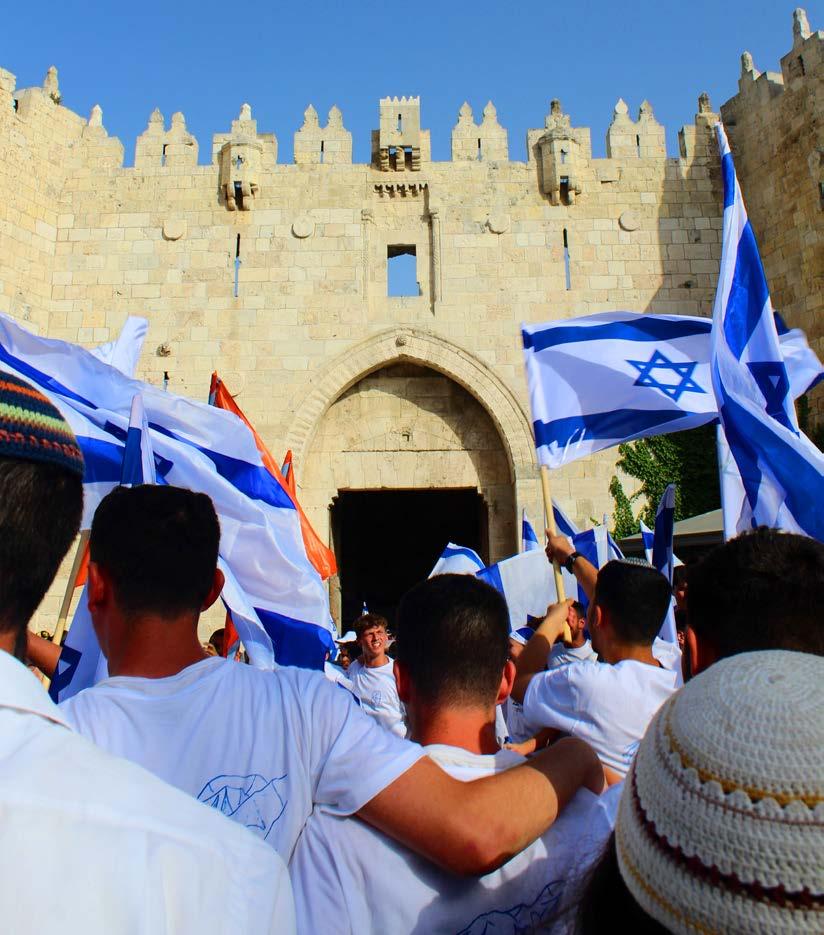
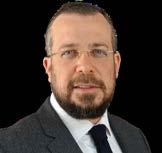
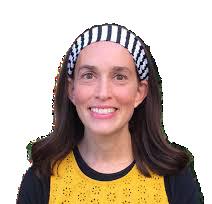
ISSUE 1515 MAY 13TH '23 ג"פשת רייא ב"כ PARSHAT BEHAR BECHUKOTAI - SHABBAT CHAZAK AVOT CHAPTER 5 ה"ב יתקוחב רהב תשרפ OU ISRAEL 02-560-9100 | TorahTidbits.com | ADVERTISING 02- 560-9125 YERUSHALAYIM IN/OUT TIMES FOR SHABBAT PARSHAT BEHAR BECHUKOTAI CANDLES 6:51PM • EARLIEST 6:01PM • HAVDALA 8:08PM • RABBEINU TAM 8:45PM Tefillat HaDerech Rebbetzin Zemira Ozarowski Director of OU Israel L’Ayla Women’s Initiative page 70 םילשורי הנבו שדוקה ריע ונימיב הרהמב The Controversial Creation of Yom Yerushalayim Rabbi Shimshon HaKohen Nadel Mara D'atra, Kehilat Zichron Yosef, Har Nof page 64 Yom Yerushalayim Sameach!
12Aliya By Aliya Sedra Summary Rabbi Reuven Tradburks
54Spiritual Vitamins in the Food of the Land Rabbi Aaron Goldscheider
56Haftorah Insights
Rebbetzin Dr. Adina Shmidman
58Rearranging Aliyot to Enable a Levi’s Aliya Rabbi Daniel Mann
60The Chadash Prohibition #3: Current Situation in Israel Rabbi Moshe Bloom
62Redeeming the First Born Rabbi Gideon Weitzman
64The Controversial Creation of Yom Yerushalayim Rabbi Shimshon HaKohen Nadel
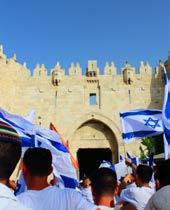
68Achdut and Yerushalayim Rabbi David Fine
72The Y- Files Weekly Comic Netanel Epstein
74OU-JLIC Yehuda Benhamu
76Torah 4 Teens By Teens Lauren Shore // Noa Feldman
2 TORAH TIDBITS 1515 / BEHAR BECHUKOTAI
week's Torah Tidbits cover
This
image!
Photo taken by Yaakov Adler
Table of Contents
I am 17 years old and live in Ramat Bet Shemesh, I am a ben aliyah. I took this photo last year on yom yerushalayim and it shows the old and the new.
04Dear Torah Tidbits Family Rabbi Avi Berman 08Never Alone Rabbi Moshe Hauer
18“The Work-Study Program”
Family Feeling
Sacks zt"l 26Probing The Prophets Rabbi Nachman Winkler 28It All Begins With Listening Rabbi Shalom Rosner 30Major Makeover Rebbetzin Shira Smiles 32Chizuk Rabbi Judah Mischel 40OU Israel Schedule 48Simchat Shmuel Rabbi Sam Shor 50Six for Six: How the World Changed in Six Days Rabbi Moshe Taragin
Rabbi Dr. Tzvi Hersh Weinreb 22
Rabbi Lord Jonathan
Yom Yerushalayim Yom Yerushalayim Yom Yerushalayim
CANDLE LIGHTING
AND HAVDALA TIMES
OTHER Z'MANIM
JERUSALEM
Ranges 11 days Wed - Shabbat
May 10-20/ 19-29 Iyar

Earliest Tallit and Tefillin 4:51 - 4:42
Sunrise 5:46 - 5:39
Sof Zman Kriat Shema 9:11 - 9:07
Magen Avraham 8:30 - 8:26
Sof Zman Tefila 10:19 - 10:17
(According to the Gra and Baal HaTanya)
Chatzot (Halachic Noon) 12:35
Mincha Gedola (Earliest Mincha) 1:10
Plag Mincha
6:00 - 6:05
Sunset (Including Elevation) 7:30 - 7:37
Seymour J. Abrams • Orthodox Union Jerusalem World Center • Avrom Silver Jerusalem College for Adults • Wolinetz Family Shul • Makom BaLev • Birthright • Yachad • NCSY in Israel • JLIC in Israel • Camp Dror • Pearl & Harold M. Jacobs ZULA Outreach Center • The Jack Gindi Oraita Program • OU Israel Kashrut
STUART HERSHKOWITZ, PRESIDENT OU ISRAEL
Zvi Sand / Yitzchak Fund: Former Presidents, OU Israel

| Rabbi Emanuel Quint z”l, Senior Vice President | Prof. Meni Koslowsky, Vice President
VAAD MEMBERS:
Michael Elman | Yonatan Frankel | Yitchak Fund | Daniella Hellerstein | Stuart Hershkowitz | Jeremy Lustman | Meir Raskas | Atara Reichel | Zvi Sand | Norman Schmutter | Mark Schneider | Esther Williams
RABBI AVI BERMAN, EXECUTIVE DIRECTOR, OU ISRAEL
Times According to MyZmanim (20 min. before sundown in most cities, 40 min. in Yerushalyim and Petach Tikva, 30 min. in Tzfat/Haifa)
OU Kashrut NCSY Jewish Action JLIC NJCD / Yachad / Our Way OU West Coast OU Press Synagogue/Community Services OU Advocacy OU Israel
MITCHEL R. AEDER, PRESIDENT OF THE ORTHODOX UNION Yehuda Neuberger, Chairman of the Board, Orthodox Union | Dr. Josh Penn, OU Kashrus Commission

RABBI MOSHE HAUER, EXECUTIVE VICE PRESIDENT | RABBI JOSHUA M. JOSEPH, ED.D. EXECUTIVE VICE PRESIDENT & CHIEF OPERATING OFFICER
Rabbi Dr. Tzvi Hersh Weinreb, Exec. V.P. Emeritus
OU KOSHER: Rabbi Menachem Genack, CEO/Rabbinic Administrator OU Kosher | Rabbi Moshe Elefant, COO/Executive Rabbinic Coordinator ISRAEL: Rabbi Yissachar Dov Krakowski, Rabbinic Administrator | Rabbi Ezra Friedman, The Gustave and Carol Jacobs Center for Kashrut Education/ Deputy Rabbinic Administrator
Headquarters: 40 Rector St. 4th floor, New York, NY 10006 212-563-4000 website: www.ou.org
Editor Emeritus: Phil Chernofsky
Editor: Rabbi Aaron Goldscheider | aarong@ouisrael.org
Advertising: Ita Rochel | 02-5609125 or ttads@ouisrael.org
Website: www.torahtidbits.com
Not getting enough TTs? Too many? None at all?
Contact our DISTRIBUTION 050-577-2111 • ttdist@ouisrael.org
David Katz, CFO, OU Israel | Chaim Pelzner, Director of Programs, OU Israel | Rabbi Sam Shor, Director of Programs, OU Israel Center Rabbi Sholom Gold, Dean, Avrom Silver Jerusalem College for Adults
22 Keren HaYesod <> POB 1441 <> Jerusalem
9101032
phone: (02) 560 9100 | fax: (02) 561-7432
email: office@ouisrael.org
website: www.ouisrael.org
Founders and initial benefactors of the OU Israel
Center: George and Ilse Falk a"h
Torah Tidbits and many of the projects of OU Israel are assisted by grants from THE JERUSALEM MUNICIPALITY
OU Israel, Torah Tidbits does not endorse the political or halachic positions of its editor, columnists or advertisers, nor guarantee the quality of advertised services or products. Nor do we endorse the kashrut of hotels, restaurants, caterers or food products that are advertised in TT (except, of course, those under OU-Israel hashgacha). Any "promises" made in ads are the sole responsibility of the advertisers and not that of OU Israel, the OU Israel Center , Torah Tidbits.
OU ISRAEL CENTER 3
BAMIDBAR HAVDALA BEHAR BECHUKOTAI EARLY CANDLES Havdala Early Candles 8:08 Yerushalayim / Maale Adumim 6:01 6:51 8:13 6:05 6:56 8:15 6:07 7:13 8:10 Aza area (Netivot, S’derot, Et al) 6:03 7:08 8:14 6:06 7:14 8:09 Beit Shemesh / RBS 6:02 7:10 8:13 6:05 7:11 8:08 Gush Etzion 6:01 7:06 8:16 6:07 7:13 8:10 Raanana/ Tel Mond/ Herzliya/ K. Saba 6:03 7:08 8:14 6:06 7:12 8:09 Modi’in / Chashmona’im 6:02 7:07 8:16 6:07 7:14 8:11 Netanya 6:03 7:09 8:14 6:06 7:12 8:08 Be’er Sheva 6:02 7:07 8:15 6:07 7:13 8:10 Rehovot 6:03 7:08 8:15 6:07 6:56 8:10 Petach Tikva 6:03 6:51 8:12 6:06 7:12 8:09 Ginot Shomron 6:02 7:07 8:17 6:08 7:04 8:11 Haifa / Zichron 6:04 6:59 8:14 6:05 7:11 8:08 Gush Shiloh 6:01 7:06 8:16 6:07 7:13 8:10 Tel Aviv / Giv’at Shmuel 6:03 7:08 8:14 6:05 7:16 8:08 Giv’at Ze’ev 6:01 7:11 8:13 6:05 7:11 8:08 Chevron / Kiryat Arba 6:01 7:06 8:16 6:07 7:13 8:10 Ashkelon 6:03 7:09 8:15 6:06 7:13 8:09 Yad Binyamin 6:03 7:08 8:15 6:05 7:08 8:10 Tzfat / Bik’at HaYarden 6:01 7:03 8:14 6:05 7:11 8:09 Golan 6:01 7:06 Rabbeinu Tam (J'lem) - 8:45PM • next week - 8:45pm Daf Yomi this Shabbat: Sota 45
DEAR TORAH TIDBITS FAMILY
RABBI AVI BERMAN Executive Director, OU Israel
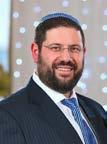
Celebrating a 100 year anniversary is a special occasion. Whether it be a grand cake with 100 candles lit, a long guest list, photographers, speeches and balloons, the occasion will not go unnoticed. Last week, I attended OU’s Kinus Mashgichim Conference, during which we celebrated 100 years of OU Kosher.

The OU Israel Kashrut team, including Rabbi Yissocher Dov Krakowski, Rabbi Ezra Friedman, Rabbi Yonatan Korach and Rabbi Yisrael Breish, flew to New Jersey to participate in the annual Kinus Mashgichim conference which took place at the Hilton Meadowlands. This year’s conference went far beyond simply celebrating the accomplishments of OU Kosher over the past century. Rather, the conference gathered 150 Rabbanim from around the world who support and sustain OU Kosher
initiatives, to learn about new areas of food production and sharpen our skills across a variety of areas in kashrut.
Rabbinical Field Representatives (RFRs) and Rabbinical Coordinators (RCs) joined the conference from Israel, Australia, Europe, Asia, the Persian Gulf and across the United States to share their experiences and learn from one another. The event kicked off with speeches from Rabbi Menachem Genack (CEO, OU Kosher), Rabbi Moshe Elefant, (COO, OU Kosher) and Dr. Josh Penn, who reflected on the achievements of OU Kosher to date and reiterated the ways in which OU Kosher continues to provide the highest level of Kosher certification in the world, with transparency as a core value.
OU Kosher was founded in 1923, certifying its first batch of products to be marketed nationally with several varieties of Heinz vegetarian baked beans in 1927. Today, OU Kosher remains the largest and most widely recognized Kosher certifying agency, with 970 mashgichim and managers, supervising more than 1.3 million products produced at 14,000 facilities in 106 countries, servicing more than 6,000 companies and providing a database for tracking 2.4 million ingredients used in
4 TORAH TIDBITS 1515 / BEHAR BECHUKOTAI
passing םילשוריו ןויצ ילבא ראש ךותב םכתא םחני םוקמה
The OU Israel Family sends heartfelt condolences to the family of Mrs. Chana Homnick a"h on her
foods that are OU certified.



I found this year’s event particularly meaningful due to the time period we are in. As we count the omer in commemoration of the 24,000 students of Rabbi Akiva who died as a result of the way they treated one another, I was touched by the level of respect each rav showed for the other. When difficult questions were posed to specific rabbis they would not hesitate to refer the question to someone they felt had more experience with that particular issue, often responding, “Don’t ask me, ask rabbi ___, he is the real mumcheh (expert) in this area.”
With a century of experience under OU Kosher’s belt, its RFRs and RCs have become well versed in areas across food production and work tirelessly to keep up with the latest advancements. These experts are available to Am Yisrael around the world, bringing unique areas of specialty to their work. To give you an idea, I connected
Aliya LaKever on the 7th Yahrzeit of Rabbi Yaakov Yechiel


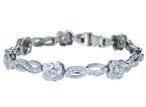
Mechel (Mel) Heftler zt"l will take place b'ezrat Hashem on Sunday, Rosh Chodesh Sivan (May 21) at 9:30am in Eretz Hachayim Cemetery, Beit Shemesh Gush 1, Chelka 7
Transportation from Beit Tovei Ha'ir (Malchei Yisrael 36) at 8:25am promptly

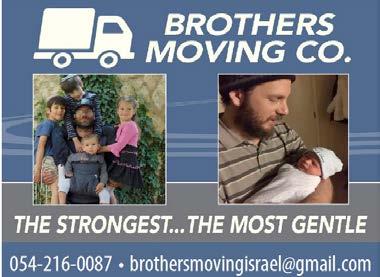
Following the Aliya laKeverSiyum & light dairy meal at the home of the Ovadia Family. Rechov Hashalosha 4/34 (7th floor) Beit Shemesh
Kindly Register by Thursday, May 18 at: 02-6414684, 050-2192535

The family
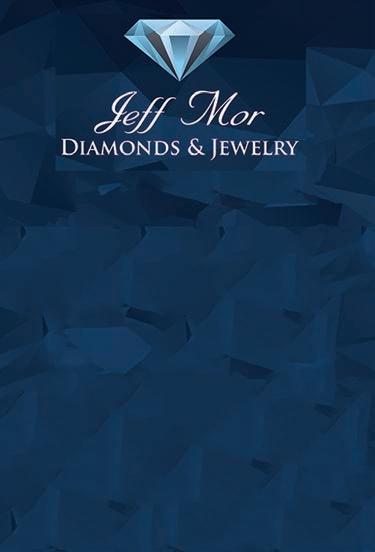
OU ISRAEL CENTER 5
diamond
Engagement Rings ∙ Stud Earrings Pendants ∙ Tennis Bracelets 050-573-9061 jeffmor36@gmail.com www.JeffMorDiamondJewelry.com
True
wholesaler from the diamond boursa with over 25 years experience
member
dealers club
with the world-renowned Rabbi Avraham Juravel who specializes in kosher ingredients, Rabbi Daniel Sharatt who specializes in the certification of leafy vegetables in Controlled Environment Agriculture. I particularly enjoyed the one-onone chavruta learning during which we delved into the mareh mekomot of various issues relating to Kashrut today, such as hydroponic-grown vegetables and new technologies facilitating food production.
During my speech I highlighted the fact that beyond supporting, maintaining and advancing OU’s high standards of Kashrut around the world, the efforts of OU mashgichim also enable the needs of Klal Yisrael to be met. With proceeds of OU Kosher invested into its existing programs such as strengthening Jewish identity across college campuses with JLIC, Yachad, NCSY, klitat aliyah, publishing Torah Tidbits and Jewish Action magazines, and creating programs for teens at risk.
Although at first I expected to see more marketing efforts around OU Kosher’s 100-year milestone, it was evident that OU Kosher’s leadership continues to remain focused on building upon what previous generations of OU mashgichim accomplished. With no time to waste on lauding our accomplishments, the conference focused participants on the task at handservicing the global tzibur.
When I heard my good friend Yoni Kempinsky, a reporter for Arutz 7, was in town, I jumped at the opportunity and invited him
to see the Kinus Mashgichim for himself. He too was blown away by what he saw, and quickly penned an article about the experience he had. You can read his article via this link: https://www. inn.co.il/news/600129

When all was said and done, despite the slices of cake offered and being featured in Jewish magazine, the OU Kinus Mashgichim conference took place virtually under the radar. Photographers, music, and a full press box were nowhere to be found. Instead, a group of 150 individuals dedicated to meeting the Kashrut needs of Am Yisrael around the world gathered to learn from one another and prepare for the challenges ahead. I truly felt privileged to spend a few days with people whom I consider to be giants in the Kashrut field.
If you would like to learn more about OU Kosher and its history, you can find a beautiful feature in Jewish Action. Pick up your copy at OU Israel or read online via this link: https://jewishaction.com/cover-story/ celebrating-100-years-of-ou-kosher/
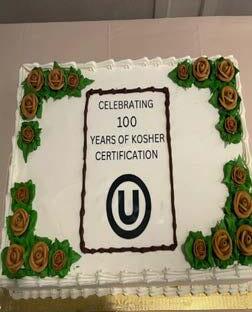
I look forward to seeing everyone on Friday morning, May 19, for OU Israel’s Yom Yerushalayim Tefila Chagigit taking place at the Tayelet, Haas Promenade in Armon Hanatziv.
Wishing you all an uplifting and inspiring Shabbat,
Rabbi Avi Berman Executive Director, OU Israel aberman@ouisrael.org
6 TORAH TIDBITS 1515 / BEHAR BECHUKOTAI
but you could possibly do them. For when it comes to communications from G-d, you are unique, irreplaceable, sui generis, one of a kind.
This exchange presents a fundamental principle of the Torah: that G-d speaks to Moshe in a way that He does not, nor will He in the future ever do again with anyone else. When Moshe says that people come to him seeking G-d, what he means is: I have access to G-d. He speaks to me. (Speaking to G-d isn’t the trick; the trick is when He answers back.) Similarly, when Moshe says that he teaches G-d’s law, what he means is that G-d communicates those laws to him and to no one else.
This could very well be the prime purpose of this Yitro story. For, in the very next story, the giving of the Torah, the very same theme of Moshe’s uniqueness as the one to whom G-d speaks is central.
3 aliya (18:24-27) Moshe heard. He chose judges, with only the most difficult cases brought to him. Moshe sent Yitro home.

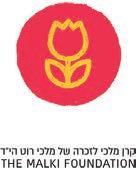
It takes an honest leader to accept suggestions to improve. Moshe displays his honesty and humility – if the suggestion is good, embrace it. Just as Yitro accepted the news of the Exodus and affirmed One G-d,

kerenmalki.org


02-567-0602

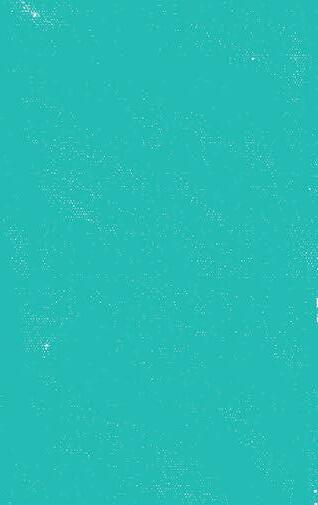
Keren Malki empowers families of children with special needs in Israel to choose home care. Donations are tax-approved in Israel, US and UK.

Honoring the memory of Malka Chana Roth ד”יה 1985-2001, killed in the Sbarro bombing.

OU ISRAEL CENTER 7
MarSea Modest Swim & Casualwear www.MarSeaModest.net (NIS) www.MarSeaModest.com ($USD) Marci Rapp 050-424-8359 THE BEST DESIGN, ENGINEERING AND INSTALLATION OF AIR davidz@AshkelonProperties.com LIVE OPPOSITE THE SEA 0544-332621 said another happy client Ashkelon for only 15% down – is actually a reality.” Owning your own apartment does not just allow you freedom, but offers monetary savings, and an increase in your investment value. Anglo-populated, sunny Ashkelon is the answer! It’s very affordable – from $500,000 with just a 15% down payment, mortgages available as well as bank guarantees. Rental income often in excess of 3.5%. LIVE OPPOSITE THE SEA davidz@AshkelonProperties.com call David at 054-433-2621 www.ashkelonproperties.com A winning community! The best beaches, new restaurants and close to shuls, shopping and the Marina. Attractive prices – no wonder so many Anglos have already bought! Ashkelon MASSAGE THERAPIST & FITNESS TRAINER 052.673.3704 I www.andyhealth.com | jerusalemmyhome@hotmail.com TUVIA ANDY HAAS BALANCE and FALL-PREVENTION SPECIALIST for OLDER ADULTS Maintain Healthy Bones and Muscles Decrease Stiffness and Joint Pain Increase Strength! Stay Independent!
OU Executive Vice President
Never Alone
Whatever the challenge or difficulty, we do so much better when we do not experience it alone. As Rashi in this week’s parsha makes clear: “‘I will scatter you amongst the nations.’ This is the harshest measure. When members of a country are exiled to a single place, they see each other and take comfort from each other. The Jewish people however were scattered such that no one was able to be connected to another.” (Vayikra 26:32, Rashi)
By contrast, the Talmud (Brachos 5b) records how Rav Yochanan would carry with him a bone fragment from the tenth child that he had lost, ל״ר. When he showed it to other bereaved parents it opened a door for them to see that he was someone who could understand what they were experiencing, who could truly empathize with their indescribable pain, and who could make them feel a bit less alone.
Relieving the loneliness of others is our fundamental role within both our family and our community.
G-d created marriage and family because “it is not good for man to be alone.” While according to Halacha, the marriage bond is created by a gift of money or something else of value, none of us has witnessed a wedding where the bride was presented with five, five hundred or five thousand

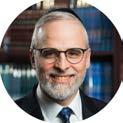
dollars. Instead, we give a ring. Money is put away, in a bank, a wallet or a drawer, while a ring – explained the Sefer HaChinuch – is worn on the finger, seen and played with all the time, a constant reminder of the special connection and relationship that it had forged, that the bearer of the ring is not alone.
While this role is easily noticed by those blessed with marriage and family, it is similarly essential to friendship and community. Author Johann Hari quotes a South African psychiatrist named Dr. Derek Summerfield who told the story of a Cambodian who worked in the rice fields. One day, he stood on a land mine left over from the war with the United States, and he got his leg blown off. They made him an artificial leg, and after a while, he went back to work in the rice fields. Apparently, it is super painful to work under water when one has an artificial limb, and it was traumatic to go back and work in the field where he had gotten blown up. He began to spend all day crying and refused to get out of bed, developing all the symptoms of classic depression. His doctors, his friends, his community, went and sat with him. They listened to him. They realized that his pain made sense, that it had perfectly understandable causes. One of the doctors, talking to the people in the community, figured, “You know, if we bought this guy a cow, he could become a dairy
8 TORAH TIDBITS 1515 / BEHAR BECHUKOTAI FROM THE
OF
DESK
RABBI MOSHE HAUER
farmer, and he wouldn’t have to go and work in the rice fields.” They bought him a cow. Within a couple of weeks, his crying stopped, within a month, his depression was gone. Notice that they did not say to this farmer, ‘Hey, buddy, you need to pull yourself together. It’s your job to figure out and fix this problem on your own.’ On the contrary, what they said is, ‘We’re here as a group to pull together with you so that together we can figure out and fix this problem.’ The listening – the community – the fact that someone understands what I am going through – that is an important part of the solution. He was already on the road to recovery when those friends came to sit with him to try to understand his sadness.
May is Mental Health Awareness Month. There are many benefits to our community when we enhance our collective awareness of mental health. We benefit from being sensitized to the issues so that we recognize them in ourselves and in others, and we gain from being educated about available resources and the many ways that these challenges can be addressed. But perhaps most importantly, by discussing these issues we relieve the terrible loneliness of those who feel they are suffering alone. Our community provides strength by any measure taken to relieve the isolation of those who will now know that there are others who share their struggles, and that they are part of a community that is aware of and sensitive to their pain.
Most exquisite properties in Jerusalem!!


NEW Listing! In Lev Rechavia Residence - pool, doorman 24/7, gym, unique 180m on one level, facing the park, succah balcony, very bright DEBORAH - 054-4804767
NEW Listing! Quiet Old Katamon - new 3 rooms Gem, totally renovated, top standard, amazing views to the forest, succah balcony, parking, storage MAYA - 054-6650184
NEW Listing! FOR RENT!!
Luxurious 300m penthouse with private pool on a 200m terrace, panoramic views of Jerusalem MAYA - 054-6650184
Luxurious apartment in Talbieh - doorman, pool, gym, 177m on one level, 32m terrace, beautiful views to the park, parking, storage DEBORAH - 054-4804767
Luxurious garden apartment on a small lane of Old Katamon, 340m built on 2 levels, 8 rooms, separate unit with separate entrance, high ceilings, full of charm, very quiet, bright, 130m private garden, top of the line finishes, close to the park
DEBORAH - 054-4804767
On the exquisite Dubnov St. in Talbieh, private 135m cottage, totally renovated with 65m private landscaped garden, views from balconies, a real gem!
MAYA - 054-6650184
New luxurious penthouse in the best Rechavia285m on one level, high end building, beautiful views from succah terraces of 190m, 4 parking spots, storages, 4 exposures, very sunny!!
DEBORAH - 054-4804767
In a small lane in the German Colony - Unique Authentic house of 700m built on a huge plot of 1,200m - perfect for making an apartment building or a tremendous private housePotential to build up to 2,000m
DEBORAH - 054-4804767
Magnificent Authentic private house on a small dead end of Baka- 650m built on 3 levels with huge basement, 750m plot with a wonderful landscaped garden. With a thoughtful layout, an abundance of light and great bones, it is a unique property!
DEBORAH- 054-4804767
In a small lane of the German Colony, Garden apartment with private entrance, 250m with private garden, parking, high ceilings, in an authentic beautiful 3 apartments building
MAYA – 054-6650184
OU ISRAEL CENTER 9
המלש האופר הגלוא ןב קזייא בל
T&T INVESTMENTS 02-6744000 0544-804767 King David St. 26 www.real-estate-jerusalem.co.il LEADING BOUTIQUE REAL ESTATE FIRM, O n M e n d e l e S t . T a l b i completely renovated, •

10 TORAH TIDBITS 1515 / BEHAR BECHUKOTAI
• Curtains & draperies
• Designer curtains
• Venetian & Woven wood blinds


• Blackout, Vertical, Roller, Roman & Pleated shades

JERUSALEM SALES
OLD KATAMON
New 160 sqm, 4 bdrms, garden, storage, parking, close to Shteblach. Occupancy - 1.5 years.
SHAAREI CHESSED / RECHAVIA
*Beautiful 3 bdrm apt + 50 sqm succah balcony, shabbat elevator, parking and view.
*Renovated 4 bdrms, terrace, private parking
*New 228 sqm duplex penthouse, 30 sqm succah balcony, shabbat elevator, parking and a view.
TALBIEH all on private land
*Renovated 3 bdrms, 130 sqm, succah, elevator, storage room, parking!
*Magnificent 250 sqm + 200 sqm garden.
BAKA
Spacious 2 bdrms, 85 sqm, succah, parking.
TALPIOT
4 rms, balcony, elevator, machsan, parking, view.
NACHLAOT

2 rms, priv entr, storage room, NIS 2,350,000
HAR NOF
*Central! 120 sqm + rental unit, lovely patio!
RECHAVIA RENTAL
Renovated, 3 bdrms, fully furnished, immediate.
FOR MANY MORE PROPERTIES: 02-651-4030
125th YEAR ANNIVERSARY
ISRAEL'S LEADING & MOST TRUSTED FURNITURE REPAIR COMPANY
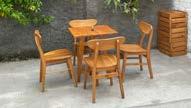


PROFESSIONAL GLUING OF ALL YOUR LOOSE & SHAKY FURNITURE REFINISHING/REFURBISHING & ALL OTHER COSMETIC REPAIRS EXPERT SOFA FRAME & RECLINER REPAIR SEAT CORE REPLACEMENT CANE SEAT/BACK REPLACEMENT
TABLE SLIDES TO EXTEND YOUR TABLE TO ALLOW FOR MORE SEATING HIGH END FURNITURE MARKERS/LEG TIPS
1159
FURNITURE TO HEALTH **************** Website:
Email: office@thefurnituredoctor.co.il Phone: 02-999-2418 WhatsApp: 058 787 3755
1898 **************** RESTORE YOUR
www.thefurnituredoctor.co.il
Eiferman Properties www.eifermanrealty.comLtd.
KI TEITZEII
BEHAR BECHUKOTAI
ALIYA-BY-ALIYA SEDRA SUMMARY
Rabbi Reuven Tradburks Director of RCA Israel Region
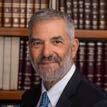
1st aliya (Vayikra 25:1-18)
Shmita: The Land of Israel has its Shabbat. Work 6 years, the 7th is a Shabbat to G-d. What grows on its own is available to be used. Yovel: 7 cycles of 7 years are followed by Yovel, the 50th year, the Jubilee year. It is holy; pronounce liberty throughout the Land. Slaves go free; Land returns to its original owner. When selling your Land, do not abuse the buyer knowing the Land will return to you in the 50th year. Sell it commensurate with the years the buyer will have until Yovel. Keeping these laws will allow you to be secure in the Land.
The theme of holiness is expanded yet again. We have had holiness in the Mikdash, our approach to Him in His home.
We have had holiness in food. Holiness in relationships; those permitted and those not. Holiness in time; Shabbat and holidays. Now we are introduced to the holiness of the Land of Israel.
There are 2 aspects to the holiness of the Land of Israel. First, it is the Land of the Jewish nation. We have unique laws of kindness in agriculture; leaving parts for the poor, giving support to the Kohanim and Leviim. These laws only apply in our Land, where we build our unique Jewish society.
And second, our Land is where G-d has invited us to be close to Him. We are closest to Him in His home, in the Mikdash. And in Jerusalem, His city. But the holiness of proximity to Him seeps outward from Jerusalem to the entire Land. Hence, the Land is holy both in our standing close to the King. And in it being our unique Homeland, the place where we live according to our unique laws, reflecting Jewish philosophy. 2nd aliya (25:19-28) Don’t be concerned that you will not have enough to eat if you rest the Land; I will provide. Let the Land not be permanently sold; for the Land is Mine, you are but sojourners on it. If one becomes needy and sells his field, redeem it. The seller may also redeem it according to the years left until it returns to him in Yovel.
After introducing our limited ownership in the Land of Israel, the Torah switches to our responsibilities one to another. When people are in trouble, help them out. The sale of a field cannot end well. It’s losing a job. In an agrarian society, what will this former landowner do for a living? This
12 TORAH TIDBITS 1515 / BEHAR BECHUKOTAI
In loving memory of our husband, father, grandfather and great grandfather "Grampy"
Dr. Bernard Friedson z"l
ל"ז רטלא ןושמש ןב רעב בד on his 17th yahrzeit - 6 Iyar
Arlene Saslow and the Friedson family
and our next step will be to plant a fruit tree. I never thought of myself as being the agricultural type, but the feeling of settling and planting a portion of Eretz Yisrael, has been truly euphoric. Iy”H, when we plant our tree, and eat the fruits that will grow one day, I think we will be able to truly appreciate that unique Kedusha found in the fruit of Eretz Yisrael!
is the beginning of a downward spiral. Redeem his field; get it back for him, so he can make a living. This is as the Talmud states: the highest form of tzedakah is giving a person a job. Redeeming the field is returning his way of making a living to him.
3rd aliya (25:29-38) A house in a city may also be redeemed if sold, but only within the first year. After that, the sale is permanent. Homes in open towns are considered like fields; they may be redeemed and they return in Yovel. The towns of the Leviim, even if walled, are always able to be redeemed and they too return in Yovel. When one is in need, help him. Do not charge interest; give him life. I am G-d who took you out of Egypt to give you this Land and to be your G-d.
To conclude, when you buy your Tu B'shvat fruit this year, don’t search for those dried apricots and banana chips imported from Turkey. Rather, head over to the fresh produce and buy yourself some nice juicy Kedusha-filled Jaffa oranges and thank Hashem for bringing you to this land in order to be able to הבוטמ עבשלו הירפמ לוכאל, imbibing that Kedusha in every bite that you take!!
The Talmud points out that the progression of stories the Torah presents here is from bad to worse. A forced sale of a field due to poverty. Then the sale of a home. Then the need for a loan. And in the next aliya, sold as a slave. The cheapest tsedaka is the first one; getting the field back, avoiding this whole collapse.
4th aliya (25:39-26:9) If one is sold to you as a slave, do not oppress him. Treat him as a worker. He goes free in the Yovel year. For you are My servants. Slaves purchased from the surrounding nations are property that passes to future generations. If a Jew is sold to a non-Jew, a relative shall redeem him, for the Jewish people are servants to Me; My servants that I redeemed from Egypt. (Bechukotai) And if you will do all my mitzvot you will have bounty, peace, unusual success against your enemies. I
4
FOR SALE
AGRIPAS ST 6,
3.9 MILLION NIS FOR A QUICK DEAL!
FOR RENT

2-ROOM APT, 2ND FL, 60 SQM - 5700 NIS
5-ROOM APT, 133 SQM, 6TH FL, 3 DIRECTIONS, BRIGHT, VIEWS -12,900 NIS
APTS ARE ALL
www.integrityrealestate.co.il
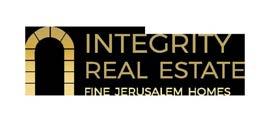

OU ISRAEL CENTER 13 OU ISRAEL CENTER 75
Ilana Nelson 054.5341403
LIVE IN A NEW BUILDING DOWNTOWN! PROPERTIES FOR SALE AND RENT ON AGRIPAS NEXT TO KING GEORGE
RMS, 102 M, 2nd FL WITH SHABBAT ELEVATOR, 2 BATHS, 2 BALCONIES, UNDERFLOOR HEATING, A/C
BEAUTIFUL, BRAND-NEW WITH UNDERFLOOR HEATING, A/C, 2 ELEVATORS
will turn to you, multiply you and fulfill My covenant with you.
Parshat Bechukotai, though short, is powerful. Following an entire book of holiness, the stakes are laid out. The pursuit of holiness in the land that is holy is a high stakes endeavor. The achievement brings wonderful blessings; food, peace, health. For us, who enjoy walking in this holy place, the blessings are abundant. Though we know from history, so is the …. opposite.
5th aliya (26:10-46) And I will be in your midst; I, your G-d, You, my people. I will remove the yokes from you and you will walk proudly. But if you do not do My mitzvot, I too will not pay attention to you. You will be subjected to illness, to enemies, to drought. If you persist in ignoring Me, I will persist in ignoring you, leaving you vulnerable to war, pestilence, famine. Your holy places will be vanquished, your cities destroyed; you will be scattered around the world. Then the Land will have the rest of its Shmita. You will panic in your exile, afraid of a driven leaf. You will admit your failings; I will remember my promises to you. Even in your dispersion, I will not allow you to be destroyed.
Failure to live up to the demands of this holy place brings desolation and exile. The desolation of the Land of Israel without the Jewish people is legendary. Chilling. The Jewish diaspora, Jewish history, is predicted here; who needs a description of its fulfillment? Jewish suffering in exile was taken by other religions to be a sign of the rejection of the Jew. The return to the Land of Israel, so unexpected, so unprecedented, and so dynamic is a powerful refutation of that. If the exile was Divine displeasure with our dismissive attitude to Him, the return to the Land can only be Divine pleasure in bringing us close. And a charge for us; to never be dismissive of Him, but to engage, to search, to reach. What privileged times we, the undeserving, are

14 TORAH TIDBITS 1515 / BEHAR BECHUKOTAI
be in loving memory and נ"
our dear parents whose yahrtzeits are in Kislev

been memorialized in a popular song, "An eternal people does not fear the long and arduous path."
Doris Weinberger a"h

ולסכ 'ד -ה"ע המלש לאקזחי תב האל הרובד
fortunate to be a part of. And how vigilant we need to be to not again be dismissive of Him in His land.
Max Weinberger z”l
ולסכ ז"כ -ל"ז בד ןב ךלמילא
Greatly missed by their children, grandchildren and great grandchildren
Rav Aryeh and Dvora Weinberger
Bernie and Leah Weinberger
Menachem and Hannah Katten
Patience is necessary for those who follow Isaac's way. But a wise woman taught us that patience is but another name for hope. That woman was Jane Austen, who put these words into the mouth of one of the characters in her great novel, Sense and Sensibility: "Know your own happiness. You want nothing but patience—or give it a more fascinating name: call it hope."
6th aliya (27:1-15) When you make a vow of your value to G-d, there are set values for different ages and stations. This value is given to the Mikdash. If you pledge an animal, it is given and should not be switched. A pledge of a home may be given or redeemed.
In observance of the Shloshim of our friend
Yehuda Leib Berren z"l
Rav Menachem Weinberg will give a shiur in his memory "Heroic Joy"
Monday evening, 23 November/ 8 Kislev
7:30pm
Zoom Meeting: 853 8980 1519
Password: Yehuda


Following the chilling section of the curses, the book of Vayikra ends with a full chapter of laws of vows. Generosity inspires contributions to the Mikdash. That’s a good thing. The religious center of the Jewish people needs contributions. But this section is not only about what is given; but also what is not. When I pledge my value, is my intent to become a monk, giving up my life to serve in the Mikdash? The Torah does not endorse that. Pay money; keep your station in life. The Torah imposes the interpretation of vows of people and their value to be monetary gifts; but not Temple slaves. If you pledge an animal? Fine, let that become a sacrifice. But not you. Or any around you. A home too; the Torah does not want the Mikdash to acquire vast holdings. Homes are for people; the Mikdash is to be splendid, grand, and inspiring. But it is not to become a vast financial empire.
7th aliya (27:16-34) If a field is pledged, it’s worth until Yovel is calculated. That value is given to the Mikdash to redeem the field. If it is not
OU ISRAEL CENTER 15
OU ISRAEL CENTER 15
SEALING SERVICES 052-385-9944 • 054-499-9043
על
SEALING SERVICES AND ROOFING
ARNONA/TALPIOTBeit Hanatziv, Derech Hevron 101A RAMAT ESHKOL Shopping Center (Above Waffle Bar) (02) 674-3888 guarantee • Contact lenses • Beautiful frames It’s not only how you LOOK It’s how you SEE המלש האופר הנאיר תב הרוא
shmuelnathan4@gmail.com
redeemed, it remains with the Mikdash even after Yovel. Property which becomes owned by the Mikdash may not be redeemed.
Fields are the quintessential means of livelihood. If you wanted the Mikdash to be a financial empire, fields would be the place to start. But the Torah’s default is that a donation of a field ought to be redeemed. Fields are for the people to make a living; not for the Mikdash.
The book of Vayikra, the book of man’s approach to G-d, ends with a sober balance. While we approach G-d, dedicate our lives to Him, reach for Him, and He for us, the Torah protects us from going too far, from divesting of our assets, ridding ourselves of our homes and becoming a Temple slave, giving our all to the Mikdash. Our challenge is to be holy in our homes and our fields while reaching for the Divine.
HAFTORAH YIRMIYAHU 16:19-17:14
The theme found in the Torah reading
A SHORT VORT
(ב:וכ) וארית ישדקמו ורמשת יתתבש תא
of blessings and curses is echoed in the haftorah which discusses the punishment to those who disregard God’s will and the reward to those who follow His will.
The courageous prophet Yirmiyahu scolds the people and warns them of the disaster if they maintain their idolatrous practices. Nothing less than exile from the Holy Land will come as the result of not having faith in God and commitment to the mitzvot.
Moreover, there is the positive outgrowth of obedience and loyalty to the Torah: “Blessed is the man who trusts in God; to whom God will be his trust. For he shall be like a tree planted by the water, and which spreads its roots out into a stream, so it will not be affected when heat comes, and its leaves shall be green, and in the year of drought will not be anxious, neither shall it cease from bearing fruit.”
The haftorah concludes with a declaration of hope and salvation: “Heal me, O God, then shall I be healed; help me, then I shall be helped, for You are my praise!”
BY RABBI CHANOCH YERES
“My Shabbats shall you observe, and My Sanctuary shall you revere” (26:2)
Why is Shabbat mentioned and moreover, why is the reverence for the Sanctuary mentioned together?
Rabbi Ovadiah Seforno (Italy 1475-1550) connected this verse to the following פarsha that discusses the punishment of Exile. He states that even without a Temple in Exile, we are to respect our Synagogues and Bati Medrash as such and keep the Sabbath.
Rabbi Moshe Feinstein zt”l gave another lesson here. He connected this phrase with the פarsha it is found in, which discusses the Laws of Hebrew slaves. The Hebrew slave may not learn from his gentile master. The Hebrew slave may not adopt the manner that the heathens serve their deities, namely, that their entire worship and faith are centered around their temples. As a result, the temple itself, with all its images, becomes the focus of all their worship. Although a Jew must revere the Temple, it is not the Temple itself that is subject of his reverence but rather the One Who commanded us concerning it. Therefore, it is imperative that we take to heart to observe the Shabbat and to revere G-d’s Temple.
Shabbat Shalom
16 TORAH TIDBITS 1515 / BEHAR BECHUKOTAI
R av, Beit Knesset Beit Yisrael, Yemin Moshe
man’s balance. lives the from of slave, challenge fields reading the punishment the scolds disaster practices. Land
sale 20% off
all winter hats

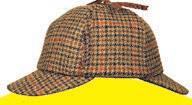
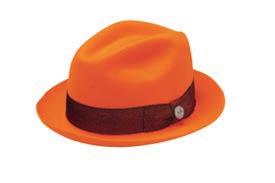




BEHAR BECHUKOTAI
10 days only may 12-21 (Including Borsalinos)

of hope and salvation: “Heal me, O God, then shall I be healed; help me, then I shall be helped, for You are my praise!” Dorot
3,
Although with "only" 24 mitzvot, B'har does not seem to be in the major league of mitzva sedras, the fact is that there are only 7 sedras
My appreciation to Rabbi Tradburks for his very clear
ALIYA-BY-ALIYA SEDRA SUMMARY
[P> X:Y (Z)] and [S> X:Y (Z)] indicate start of a parsha p’tucha or s’tuma. X:Y is
is the number of p’sukim in the are the Mitzva-count of Sefer HaChinuch AND Rambam’s Sefer HaMitzvot. A=ASEI; is the perek &
FIRST ALIYA
One of the most famous sedra openers in the Torah: "And G-d spoke to Moshe AT HAR SINAI saying..."
The unusual nature of the pasuk is based on the rare additional words in the otherwise very familiar pasuk: And G-d spoke to Moshe saying (which
OU ISRAEL CENTER 17
STATS MITZVOT B&B BECHUK BEHAR - 33rd 32nd of 54 sedras in Torah - 10th 9th of 10 in Vayikra 230 13199 Lines - 47th 50th Rank (Among The 54) 12 57 Parshiyot 431 P’tuchot 8 26 S’tumot 135 78 57 P’sukim - 46/7 50/10 Rank (Torah/Vayikra) 1750 1013 737 Words - 47/7 50/10 Rank (Torah/Vayikra) 6809 3992 2817 Letters - 47/7 50/10 Rank (Torah/Vayikra) B%B BECHUK BEHAR 14+22 7+5 7+17 Mitzvot (pos/prohib)
Rishonim
Jerusalem •
02 563-7155 • www.SherlockSHats.com
Tel:
BY RABBI DR. TZVI HERSH WEINREB OU Executive Vice President, Emeritus

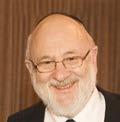
“The Work-Study Program”
It has been quite a long time now since I first heard the term “work-study program.” This was a special federal program designed to assist young adults with limited financial means to achieve a professional education. Recipients of this grant were encouraged to continue with their jobs, to work, but were also paid to enroll in college level training courses, to study. Hence the term “workstudy program.”
There was something about this term that struck me as odd. It seemed to make a distinction between work and study. It conveyed, to me at least, the notion that study was not work. To someone who had been trained in the yeshiva system, this notion was unacceptable. Study is work!
May
In this week’s double Torah portion, Behar-Bechukotai, we come across the following phrase: “If you shall walk in My statutes...” (Leviticus 26:3) Rashi explains what it means to “walk” in the ways of God’s statutes. He suggests that “walking” here means that we must “toil in the Torah, shetihyu ameilim batorah.”
The concept of “toiling in the Torah” is a basic one to anyone familiar with Torah study. But those less familiar with the subject can legitimately be puzzled by the phrase. They surely can understand learning Torah, or studying Torah, or comprehending Torah. But what does it mean to “toil” in the Torah?
My life-long interest in educational psychology has prompted me to analyze the process of “Torah-toil” and break it down into several components, or stages.
The first stage consists of diligence, of what is known in Hebrew as hatmadah. This is a requirement of putting in time. Torah study cannot be done on a piecemeal basis, in small segments of five or ten minutes. It requires sustained concentration and long hours of simply sitting and poring over the text.
The ideal Torah student is constantly studying. His is the image portrayed by the great poet Chaim Nachman Bialik in his masterpiece, HaMatmid. There he describes the night and day devotion of the young man to his studying task in moving and inspiring
18 TORAH TIDBITS 1515 / BEHAR BECHUKOTAI THE PERSON IN THE PARSHA
the Torah learning from this issue be תמשנ יוליעל and in loving memory of Joe (Yosef) Goodman ל"ז of London/Israel on his 25th yahrzeit
Missed By Susie, Terry, Judy, David, Neil, Grandchildren & Great Grandchildren
terms. For Bialik, himself once a yeshiva student, the “matmid” is the true hero of Jewish history.
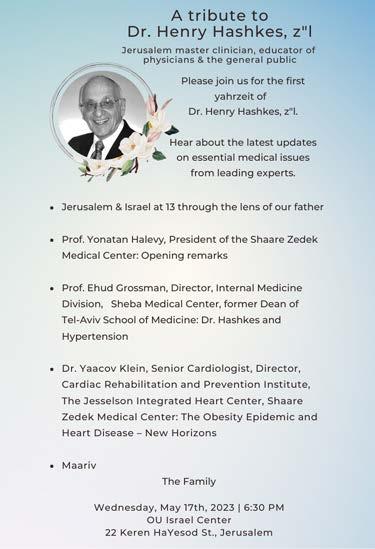

The second stage is that of struggle, of encountering the text and figuring out its basic meaning. This is difficult even to the student whose first language is Hebrew, and is even more challenging to those of us who grew up speaking English or another language and who come to the texts at a disadvantage.
There are skills that must be mastered in order to decipher the give and take of the Talmud and its commentaries. Simple meaning, punctuation, knowing where questions end and answers begin, understanding implicit assumptions, appreciating nuance – these are all aspects of this second stage of wrestling with the text.
In recent times, aids to Torah study have
OU ISRAEL CENTER 19
proliferated. Translations, elucidations, and abbreviations make the process much more user friendly. Sometimes, however, in my opinion, these valuable tools come at the cost of the kind of mastery which can only emerge from intense efforts and cannot be achieved through shortcuts.
And here we come to a third stage of Torah study: learning from one’s mistakes. The Talmud itself maintains that “a person can only study Torah successfully if he makes errors in the process, elah im kain nichshal bah.” All Torah students make mistakes in the initial phases of study sessions. They, or their study partners, soon detect these errors and correct them. Then real learning occurs.
In the fourth stage of this toil, the students probes and questions. He searches his memory for passages which might contradict the text at hand. He wonders about the underlying assumptions of what he has just read, and how they fit with principles from other sections of the Torah with which he is familiar. He consults the numerous supercommentaries to see whether his questions were anticipated by previous Torah students, perhaps centuries ago. This is stage four.
A fifth stage, omitted by some but essential in my personal opinion, is the search for relevance. “What personal meaning,” the student must ask, “can I find in the text I have just mastered?” “How can it be
applied to current events, to contemporary problems, or maybe even to my own life experience and personal dilemmas?”
And finally we come to a sixth stage: teaching others. Maimonides, in his Treatise on the Mitzvot, asserts that one has not fulfilled the mitzvah of Torah study unless he shares his learning with others. Lilmod, to study, ulelamed, to teach.
How well I recall the process demanded of us by my favorite teacher, Reb Shmuel Dovid, who had each of us explain every passage we learned aloud to the rest of the class until our peers felt that we had explained it well. “If you can’t explain something,” he insisted, “then you don’t understand it.”

I have shared with you my own personal analysis of the many ingredients of effortful Torah study. Others have offered different analyses to be sure. But I hope that my highly personal perspective has helped clarify the idea of “toiling in the Torah” to you.
The fact that the Torah involves so much effort, such intense and diverse tasks, helps us understand why true Torah greatness, gadlut, is so rare and so appreciated.
We also understand why the reward for such toil is “rain in its season, a land of bountiful crops, and trees of the field that yield their fruit.” (Leviticus 26:4)
Enjoy your Shabbat, and remember that one way to enjoy it is to use it to “toil in the Torah.”
20 TORAH TIDBITS 1515 / BEHAR BECHUKOTAI
OU Israel extends a heartfelt Mazel Tov to Aviva & Yossi Hoch on the engagement of their daughter Chana to Avi Feldman
US Citizenship for your Children and Grandchildren
Michele Coven Wolgel
Attorney
and Notary
Specializing in American Immigration and Naturalization Law for over 30 years

Early filing critical due to Corona delays!!!
www.wolgelaw.co.il
www.facebook.com/uscitizenshipinfo lawyer@wolgelaw.co.il
Tel: 02 590 3444
Member, AILA (American Immigration Lawyers Association)

Of Counsel to Bretz & Coven, LLP
www.bretzlaw.com
FOR
TALBIEH (MAPU) - 4 rooms, first floor, large balcony, private parking, storeroom, private land. Walking distance to King David Hotel, Yemin Moshe, Old City, Mamila. Exclusive! Moshe 053-6305725
In Picturesque Yemin Mosheunique well-designed house, 290m, nice open patio + balcony to Old City view, near parking, walking distance to the Old City, Mamilla, synagogues, major hotels, the First Station, etc. Exclusive!
Galila 053-9345985
GERMAN COLONY - (HATSFIRA) 5.5 rooms, especially sunny (4 exposures) entire level, Sukkah terrace, private parking, storage, potential, Exclusive! Moshe 053-6305725
OU ISRAEL CENTER 21 JERUSALEM REAL ESTATE ANGLO- SAXON-JERUSALEM ISRAEL’S LEADING REAL ESTATE NETWORK
St., Jerusalem
3 Moshe Hess
0778038511
SALE IN JERUSALEM:
COVENANT & CONVERSATION
Family Feeling
I argued in my Covenant & Conversation for parshat Kedoshim that Judaism is more than an ethnicity. It is a call to holiness. In one sense, however, there is an important ethnic dimension to Judaism.
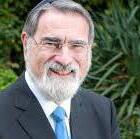
It is best captured in the 1980s joke about an advertising campaign in New York. Throughout the city there were giant posters with the slogan, “You have a friend in the Chase Manhattan Bank.” Underneath one, an Israeli had scribbled the words, “But in Bank Leumi you have mishpachah.” Jews are, and are conscious of being, a single extended family.
This is particularly evident in this week’s parsha. Repeatedly we read of social legislation couched in the language of family:
When you buy or sell to your neighbour, let no one wrong his brother. (Lev. 25:14)
If your brother becomes impoverished and sells some of his property, his near redeemer is to come to you and redeem what his brother sold. (Lev. 25:25)
If your brother is impoverished and indebted to you, you must support him; he must live with you like a foreign resident. Do not take interest or profit from him, but fear your God and let your brother live with you. (Lev. 25:35-36)
If your brother becomes impoverished and is sold to you, do not work him like a slave. (Lev. 25:39)
“Your brother” in these verses is not meant literally. At times it means “your relative”, but mostly it means “your fellow Jew”. This is a distinctive way of thinking about society and our obligations to others. Jews are not just citizens of the same nation or adherents of the same faith. We are members of the same extended family. We are – biologically or electively – children of Abraham and Sarah. For the most part, we share the same history. On the festivals we relive the same memories. We were forged in the same crucible of suffering. We are more than friends. We are mishpachah, family.
The concept of family is absolutely fundamental to Judaism. Consider the book of Genesis, the Torah’s starting-point. It is not primarily about theology, doctrine, dogma. It is not a polemic against idolatry. It is about families: husbands and wives, parents and children, brothers and sisters.
22 TORAH TIDBITS 1515 / BEHAR BECHUKOTAI
ה״ע זייא דוד לארשי
הדלוגו
ה״ע רטרש קחצי
תומשנ יוליעל
תב
רשא בקעי ןב סחנפ
תב הינעמו בייל הירא ןב לאירזע
Thoughts on the Weekly Parsha from RABBI LORD JONATHAN SACKS ZT"L
Former Chief Rabbi of the United Hebrew Congregations of the Commonwealth
May the learning of these Divrei Torah be תמשנ יוליעל HaRav Ya'akov Zvi ben David Arieh zt"l
At key moments in the Torah, God Himself defines His relationship with the Israelites in terms of family. He tells Moses to say to Pharaoh in His name: “My child, My firstborn, Israel” (Ex. 4:22). When Moses wants to explain to the Israelites why they have a duty to be holy, He answers, “You are children of the Lord your God” (Deut. 14:1). If God is our parent, then we are all brothers and sisters. We are related by bonds that go to the very heart of who we are.
The prophets continued the metaphor. There is a lovely passage in Hosea in which the prophet describes God as a parent teaching a young child how to take its first faltering steps: “When Israel was a child, I loved him, and out of Egypt I called My son … It was I who taught Ephraim to walk, taking them by the arms … To them I was like one who lifts a little child to the cheek, and I bent down to feed them.” (Hosea 11:1-4).
The same image is continued in rabbinic Judaism. In one of the most famous phrases of prayer, Rabbi Akiva used the words Avinu Malkeinu, “Our Father, our King”. That is a precise and deliberate expression. God is indeed our sovereign, our lawgiver and our judge, but before He is any of these things He is our parent and we are His children. That is why we believe Divine compassion will always override strict justice.
This concept of Jews as an extended family is powerfully expressed in Maimonides’ Laws of Charity:
The entire Jewish people and all those who attach themselves to them are like brothers, as [Deuteronomy 14:1] states: “You are children of the Lord your God.”
Jerusalem Real Estate is My Business

Eta: 054-723-3863 Rachel: 052-546-6425
Amazing stand alone homes in OLD KATAMON, TALBIYA, BAKA, GERMAN COLONY

OLD KATAMON 80 sqm with 2 bedrooms and 2 bathrooms, one flight up with elevator. Completely renovated with terrace that opens into a sukka. Full of light & surrounded by greenery. Very quiet Price 4,200,000 NIS

Fantastic opportunity to buy 170 sqm on one floor, with sukka terrace, Shabbat elevator, brand new apt ready in 2 years. Only 6,500,000 NIS.

In GERMAN COLONY, 140 sqm on one floor, 2nd floor walk up, completely renovated with 4 bedrooms and 2 full bathrooms. Large sukka terrace. 7,100,000 NIS
In BAKA, most sought out location. New apartment duplex of 236 sqm plus 81 sqm of outdoor space. Plus parking. For more info call Eta: 0547233863
In the heart of BAKA enclosed in a magical courtyard:
3 bedrooms 2 full bathrooms one flight up. Beautiful spacious sukka terrace facing open gardens. Completely renovated with architectual design & high level finishes.

6,250,000 NIS
Eta Morris Realty, Ltd.

etamorrisrealestate@gmail.com
Eta: 054-723-3863 · Rachel: 052-546-6425
etamorrisrealty.co.il
OU ISRAEL CENTER 23
And if a brother will not show mercy to a brother, who will show mercy to them?
To whom do the poor of Israel lift up their eyes? To the Gentiles who hate them and pursue them? Their eyes are turned to their brethren alone. (Mishneh Torah, Laws of Gifts to the Poor, 10:2)
This sense of kinship, fraternity and the family bond, is at the heart of the idea of Kol Yisrael arevin zeh bazeh, “All Jews are responsible for one another.” Or as Rabbi Shimon bar Yohai put it, “When one Jew is injured, all Jews feel the pain.”1
Why is Judaism built on this model of the family? Partly to tell us that God did not choose an elite of the righteous or a sect of the likeminded. He chose a family – Abraham and Sarah’s descendants — extended through time. The family is the most powerful vehicle of continuity, and the kinds of changes Jews were expected to make to the world could not be achieved in a single generation. Hence the importance of the family as a place of education (“You shall teach these things repeatedly to your children …”) and of handing the story on, especially on Pesach through the Seder service.
Another reason is that family feeling is the most primal and powerful moral bond. The scientist J. B. S. Haldane famously said, when asked whether he would jump into a river and risk his life to save his drowning brother, “No, but I would do so to save two brothers or eight cousins.” The point he was making was that we share 50 per cent of our genes with our siblings, and
an eighth with our cousins. Taking a risk to save them is a way of ensuring that our genes are passed on to the next generation. This principle, known as “kin selection”, is the most basic form of human altruism. It is where the moral sense is born.
That is a key insight, not only of biology but also of political theory. Edmund Burke famously said that “To be attached to the subdivision, to love the little platoon we belong to in society, is the first principle (the germ as it were) of public affections. It is the first link in the series by which we proceed towards a love to our country, and to mankind.”2 Likewise Alexis de Tocqueville said, “As long as family feeling was kept alive, the opponent of oppression was never alone.”3
Strong families are essential to free societies. Where families are strong, a sense of altruism exists that can be extended outward, from family to friends to neighbours to community and from there to the nation as a whole.
It was the sense of family that kept Jews linked in a web of mutual obligation despite the fact that they were scattered across the world. Does it still exist? Sometimes the divisions in the Jewish world go so deep, and the insults hurled by one group against another are so brutal that one could almost be persuaded that it does not. In the 1950s Martin Buber expressed
2 Edmund Burke (1729–1797). Reflections on the French Revolution: The Harvard Classics, 1909–14.
3 Democracy in America, Chapter XVII: Principal causes which tend to maintain the democratic republic in the United States.
24 TORAH TIDBITS 1515 / BEHAR BECHUKOTAI
1 Mechilta de-Rabbi Shimon bar Yochai to Ex. 19:6.
the belief that the Jewish people in the traditional sense no longer existed. Knesset Yisrael, the covenantal people as a single entity before God, was no more. The divisions between Jews, religious and secular, orthodox and non-orthodox, Zionist and non-Zionist, had, he thought, fragmented the people beyond hope of repair.
Yet that conclusion is premature for precisely the reason that makes family so elemental a bond. Argue with your friend and tomorrow he may no longer be your friend, but argue with your brother and tomorrow he is still your brother. The book of Genesis is full of sibling rivalries but they do not all end the same way. The story of Cain and Abel ends with Abel dead. The story of Isaac and Ishmael ends with their standing together at Abraham’s grave. The story of Esau and Jacob reaches a climax when, after a long separation, they meet, embrace and go their separate ways. The story of Joseph and his brothers begins with animosity but ends with forgiveness and reconciliation. Even the most dysfunctional families can eventually come together.
The Jewish people remains a family, often divided, always argumentative, but bound in a common bond of fate nonetheless. As our parsha reminds us, that person who has fallen is our brother or sister, and ours must be the hand that helps them rise again.
These weekly teachings from Rabbi Sacks zt”l are part of his ‘Covenant & Conversation’ series on the weekly Torah teaching. With thanks to the Schimmel Family for their generous sponsorship, dedicated in loving memory of Harry (Chaim) Schimmel. Visit www.RabbiSacks.org for more.


• 4 rooms, 115m, in Pinsker building. fully renovated, closets, electrical appliances, high floor, succa, magnificent views, immediate
• Wolfson Towers - 5 rooms, 135m, facing views, high floor, totally renovated, Shabbat elevator
• San Simon, penthouse, 300m, duplex, 5 bedroom. Magnificent views, parking, Shabbat elevator
• Katamon - 4 room garden apt. renovated, parking, close to shteiblach, shopping
• Wolfson Towers - 5 room apt. renovated, high floor, views, Shabbat elevator
052-2639702
OU ISRAEL CENTER 25
Rental sale
| www.shneller.co.il
co.il
Shiffy@shneller
Dr. Harry Weisman Former Assist. Clinical Professor of Medicine, UCLA School of Medicine; Div. of Endocrinology & Metabolism Weight loss Consultation +972 53 472 2159 Author of The 18% Solution –Lose 18% of Your weight in 18 Weeks
PROBING THE PROPHETS
BY RABBI NACHMAN (NEIL) WINKLER Faculty, OU Israel Center
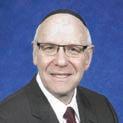
Listening to the Torah reading this week can be a rather difficult challenge. The first parasha of B’har delineates the various mitzvot that would be incumbent upon Israel to observe upon their entry to the land, including the laws of Shemita and of Yovel, as well as the proper the regulations regarding the sale and redemption of ancestral estates. In short, the first parasha lays down these requirements to impress upon the nation the inherent sanctity of the land – and the privilege they received to live there. In contrast to that theme, the second parasha of B’chukotai focuses on the punishments and eventual exile from the land were the people to ignore the holiness of Eretz Yisrael and fail to observe those laws and regulations. The theme of the second parasha, therefore, is one a denial of the sanctity of the land and the loss of our privilege to live there.
One parasha of promise; one parasha of doom.
Further upsetting our peaceful Shabbat is the worrying choice of past scholars to read the 16th and 17th prakim of Sefer Yirmiyahu for our haftarah. These chapters seem, at first glance, to focus our attention upon the tochacha (admonition) portion of B’chukotai, with the navi’s harsh words assailing the sins of the people. The navi’s forewarnings such as: “Chatat Yehuda k’tuva b’et barzel” – “The sin of Yehuda is written with a pen of iron”, or “v’ha’avad’ticha et oyvecha ba’aretz asher lo yad’ta” – “I shall make you serve your enemies in a land you do not know”…” and “”ki esh k’dachtem b’api, ad olam tukad”” – “the fire you’ve kindled in My anger will glow into the future.” – these are not messages that we would want to keep in our hearts as we turn back to our tefillah on Shabbat!
With these disconcerting thoughts, I turned to HaRav Shimshon Rafael Hirsch to see how he understands these troubling messages. And I am glad that I did. Rav Hirsch sees this haftarah in a totally different light. “Hashem Uzi U’ma’uzi”, the opening words of the haftarah, praising Hashem as his “strength and refuge”, sets the tone for the entire haftarah, argues Rav Hirsch. The navi, who was witness to the destruction of the Mikdash and the galut of his people, nonetheless glorifies G-d as

26 TORAH TIDBITS 1515 / BEHAR BECHUKOTAI
המלש האופר האל היח ןב םייח עשוהי
Rabbi Winkler's popular Jewish History lectures can be viewed by visiting the OU Israel Video archive: https://www.ouisrael.org/video-library
his “strength” and his “refuge” because he does not see the galut experience simply as a punishment. Rather, he sees the sad years of the Diaspora as a prelude to the great redemption.
As Rav Hirsch writes:
“G-d, who made this powerless, helpless, abandoned…people triumphant, and gave them indomitable independence and endurance …and always accorded them refuge and salvation in every hour of danger….will ultimately gather all the nations to Him.”
In the eyes of Rav Hirsch, our haftarah is not a reflection of the tochacha in the parasha, but its very antithesis! Our ancients chose this message of Yirmiyahu in order to grant us comfort after having listened to the tochecha. Israel’s survival of the galut - with its sufferings, its pogroms, its ghettos – proves why Hashem is “Uzi Uma’uzi”. The terrible tochacha of the parasha must be seen as the precursor to the magnificent geula!
And, when we see the haftarah as Rav Hirsch does, if we regard the parasha’s admonitions as part of the redemption process, we are able to return to our tefillot in a much better frame of mind.

I know that I will!
LIFE SETTLEMENTS


Do you have a life insurance policy you:
• No longer want?
• No longer need?
• Can no longer afford the premium?


• Could you use extra money instead of keeping your policy?
I can guarantee that if you qualify with the underwriting process I can get you more money than if you cash it in with the company.
Please contact Moshe Russell at: Buymypolicy32@gmail.com

FOR SALE
FOR SALE
FOR SALE
FOR SALE
FOR SALE
WE ARE TAKING OUR EXCLUSIVE PROPERTIES TO THE US, THE UK AND AUSTRALIA!

PRICE REDUCTION! NIS 7,950,000 - Tehila: 050-420-5333
2 RENOVATED STUDIO APTS, MACHANE YEHUDA, JLM 2 rooms|3rd floor|15+18m²|rented out for NIS 2700+2500 NIS 1,590,000 - Tehila: 050-420-5333
COZY & AIRY APT, MACHANE YEHUDA, JLM
2BR |4th floor |45m² built |4m² balcony NIS 1,910,000 - Mendel: 052-720-3497
SPECTACULAR PENTHOUSE, OLD KATAMON, JLM
4.5 BR penthouse |140m²| roof terrace with view NIS 7,490,000 - Noa: 052-870-2387
ATTRACTIVE PROPERTY, NACHLAOT, JLM

2 BR | 65m²|balcony|parking|storage NIS 2,730,000 - Tehila: 050-420-5333
Exptected occupancy: Dec. 31st '23
FOR SALE APT WITH GORGEOUS VIEW, HAR HOMA, JLM 3BR|81m²|2 bathrooms |Ground floor out of 5 PRICE REDUCTION! NIS 2,980,000 - Ouriel: 058-516-1356
FOR SALE
FOR SALE
EXCELLENT APT FOR INVESTMENT, FRENCH HILL, JLM

2 BR | 7th floor out of 7 | 63 sqm | in process of Pinui Binui
2,250,000 NIS - Ouriel: 058-516-1356
FOR SALE: AMAZING DUPLEX PENTHOUSE, EFRAT: 4 BR, 168 sqm | large balconies |3 exposures NIS 3,895,000 - Noa: 052-870-2387
FOR SALE COTTAGE WITH TREMENDOUS POTENTIAL, EFRAT 6BR|190m²|on 4 levels|3 baths|sukkah balcony
FOR SALE
FOR SALE
FOR SALE
NIS 3,690,000 - Noa: 052-870-2387
BEAUTIFUL SEMI-DETACHED HOME, EFRAT 5BR |3 stories |180m² built |160m² garden
NIS 4,950,000 - Noa: 052-870-2387
FABULOUS APT WITH CHARMING YARD, MITZPE YERICHO 6BR | 165m² built | 70m² garden|storage unit
Price reduction! For more info: Mordechai: 052-720-3089
PRIVATE HOME WITH STUNNING VIEW, MITZPE YERICHO 5BR|4 baths|330m² built|500m² lot|sukkah balcony
NIS 4,300,000 - Mordechai: 052-720-3089

OU ISRAEL CENTER 27
BS″D Real Estate | Investments | Management services Noam Homes THIS IS THE TIME TO MARKET YOUR PROPERTIES IN A REAL ESTATE OFFICE WITH EXCELLENT EXPOSURE! Scan to visit our site www.noamhomes.com
Scan to visit our site www.noamhomes.com Real Estate | Investments | Management services www.noamhomes.com | office@noamhomes.com Noam Even 058-793-2222 2020 From your friends at NOAM HOMES Real Estate Professionals The TOP 10 Real Estate Office in Jerusalem for 2020 & 2021 (MADLAN) HAPPY Passover NACHLAOT Great Investment Property, devided into 3 units! Beautiful 5 room duplex, built to a high standard! Lot with with Complex private Authentic 5.5 room Home with character and beauty! MALCHA NACHALAT ACHIM GERMAN Look for us: NOAM HOMES Noam Homes 24 Even Sapir St., Jerusalem 058-793-2222 office@noamhomes.com AMAZING COTTAGE, BET HAKEREM, JLM 4.5BR|179m² built|on 3 levels|180m² garden|renovated
BS″D
GET IN TOUCH WITH US TODAY TO GET THE BEST EXPOSURE FOR YOUR PROPERTY.
Rav Kehilla, Nofei HaShemesh Maggid Shiur, Daf Yomi, OU.org Senior Ra"M, Kerem B'Yavneh

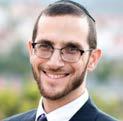
It All Begins With Listening
Parshat Bechukotai opens on a positive note describing the blessings that will befall upon us if we fulfill the mitzvot. We will be blessed with rain, excess produce, peace etc. Then there is a lengthy depiction of what will transpire in the event that Am Yisrael does not follow in the path of the Torah. It is known as the tochecha. There is a narrative of many atrocities, all of which we have unfortunately witnessed throughout the generations.
When we are introduced to the blessings the term used is -ּוכ ֵלֵּת י ַתֹּקֻחְּב־םִא - if you follow in the path of my statues (Vayikra 26:3). However, when introduced to the curses, the phrase used is יִל ּו עְמְׁשִת אֹל־םִאְו - But if you do not listen to Me (Vayikra 26:14). Why is the language not parallel? It should have stated – if you do not follow in the path of my statutes. וכלת אל יתקחב םא. Why does the Torah prefer to use the term ועמשת אל, a lack of listening when introducing the reason for the severe punishments?
We will provide an answer based on an idea expressed by L’shimcha Elyon. The first step in getting anywhere is listening. All too often people may hear another,
but the sound enters one ear and exits the other. Listening is not just hearing. It is processing, internalizing and understanding what is heard.
The gemara in Eruvin (13) declares that when there is a dispute between Bet Hillel and Bet Shamai, most often the halacha is in accordance with the view of Bet Hillel. One of the explanations provided is because Bet Hillel tried to understand the shita of Bet Shamai first. They were willing to listen and delve into what another expressed in order to reach the truth.
Bet Hillel learned from Hillel - an individual who was likely one of the greatest listeners who ever lived. A story is told in the gemara of a Friday afternoon where a visitor appeared at Hillel’s door shortly before Shabbat to ask Hillel several trivial questions. Hillel listened intently to each question and patiently responded. It is Hillel who listened to the requests of three potential converts who attached conditions to their conversions (one wanted to be the
28 TORAH TIDBITS 1515 / BEHAR BECHUKOTAI
RABBI SHALOM ROSNER
kohen gadol, another to learn the Torah on one foot). After understanding each of them, he knew how best to respond and each accepted Judaism unconditionally.
With respect to Yitro we are told עמשיו ורתי – Yitro heard. The entire world heard of what transpired at Yam Suf. Yitro not only “heard”. It did not just enter his ears, it entered his heart! He internalized and changed his life based on what he learned.
Imagine an individual learning about the mitzva of tzadaka. He is then interrupted by a knock on the door and a poor man asks for charity. The individual’s response is “sorry, I am in the middle of learning right now and I cannot interrupt my studies to engage in giving charity.” Such an individual may be gaining an understanding of the mitzva of charity, but he does not listen to what he learns.
The tochacha begins with a warning to us. If we do not listen to the words of the Torah- if we do not internalize what we learn and make it a part of us, then we will likely not properly fulfil the commandments.
As we state twice daily – Shema Yisrael –Listen Israel – may we be able to make the Torah a part of us so that the fulfillment of mitzvot becomes second nature.
KOSHER APT FOR WEEKLY RENT
Netanya Bialik St., 2 bedrooms, Sea view, across from promenade, Shuls, market, A/C, Cable TV, wi-fi, linens, non-Shabbat Elevator. 700 NIS/night
Email: lovelyvacationapartment@gmail.com
WhatsApp USA: +1-631-523-3202
FOR SALE
GREAT INVESTMENT IN NACHALAOTCharming 2 rooms, nice garden, character, quiet, good location 2,100,000 NIS
GIVAT ORANIM - Large 3 rooms, first floor, small garden, good shape, 3 balconies, parking, 2,600,000 NIS
KIRYAT SHMUEL - Penthouse, 5 rooms, 180m, small building with accessibility, elevator, terrace, 30m, master bedroom, for renovation, parking, rare!
HEART OF BAKA WITH GARDENluxury 5 rooms, 200m, with private garden of 125m, large living room, 2 parkings, storageroom, quiet, rare!
28, Kovshei Katamon Street, Jerusalem Tel: 02.5633008 - www.ben-zimra.com
Orit Madar,Adv
Family Law and Mediation
Divorce, Child support, Custody
Inheritance & Wills
Yariv Madar, Adv.
Bodily Injuries, Medical Malpractice Civil Litigation 10 Hillel St., Jerusalem | 36 Dam hamkabim st., Modiin 02-6255592, 050-3202909 Madar@netvision.net.il
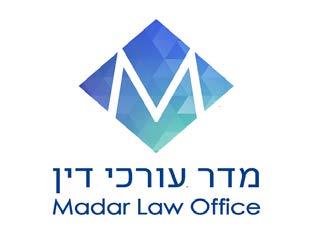
OU ISRAEL CENTER 29
ENGLISH SPEAKING LAW FIRM
Major Makeover
“Im bechukotai teleichu ve’et mitzvotai tishmiru ve’asitem otam - If you follow my laws and keep my mitzvot and perform them…” (Vayikra 26;3) This is the prerequisite to receiving the beautiful rewards of enjoyment and tranquility promised by Hashem. The Midrash notes the redundancy in the verse and comments on the curious choice of the words “ve’asitem otam”, drawn from the root word “asah – to make”. The sages thus said that if one follows the Torah, G-d will consider it as if he himself has “made” the mitzvah. Another interpretation offered by the Midrash is that Hashem will consider one who does the mitzvot to have “made” himself. What is the Midrash trying to teach us with these exegetical comments?
The Tosher Rebbe in Avodat Avodah comments on the Midrash - how is it possible for us to deserve any credit for doing mitzvot? Hashem gives us a house, only then can we put up a mezuzah. Hashem gives us a child; only then can we perform a bris. Every opportunity to
do a mitzvah is G-d given, what do we do that is deserving of reward? Thus, says the Tosher Rebbe, the only mitzvot we can take credit for are those that we “initiate.” Meaning, that a person takes a non-mitzvah activity and elevates it to serve Hashem. When a person eats with the intention of serving Hashem, he has transformed that moment and created a spiritual connection. We know that when Hashem created the world, He did not send down rain until man was present to work the land. Rain, geshem, is a metaphor for gashmiut, the physicality of this world. Material matter is only worthy of being in this world if man can transform it into something sublime.
How do we understand that if one keeps Torah and mitzvot, he is considered to have “made himself?” Rav Reiss in Me’rosh Tzurim explains that Torah directs our actions and perspectives so we become more spiritual and elevated. Torah laws guide us how to speak, think, and even
For Sale: 25 Ben Maimon, 4 rooms, 113m, 2 bathrooms, porch, 1st floor, elevator, 6.2 million NIS

For Sale in Katamon: exclusive, Rashbag st., garden apt, renovated, a/c, underfloor heating, 5 rooms, 146m, asking 4.7million NIS
Smadar 050-3114040 // 02-642-4329
smadi_bida@walla.co.il
30 TORAH TIDBITS 1515 / BEHAR BECHUKOTAI REBBETZIN SHIRA
SMILES Faculty, OU Israel Center
המלש האופר אנדהאב לרפ ןב עשוהי םהרבא
how to feel towards others. When one allows his Divine image to dominate his every activity and response, he becomes a king over his inner world; his self-control “makes” him who he is. Hence, the great variety of mitzvot are not to be viewed as a burden imposed upon us from Above, rather, they serve as repetitive practice to ensure that our spiritual selves govern our decisions and choices.









Consequently, Rav Scheinerman in Ohel Moshe explains Dovid Hamelech’s impassioned words, “tzama lecha nafshi, kama lecha be’sari - my soul yearns for You, my flesh pines for You” (Tehillim 63;3). Clearly, it is not surprising that one’s soul would yearn for Hashem, but for the physical body to yearn for Hashem… that can only come from the transformative nature of living a Torah life. With the focused practice of Torah and mitzvot we indeed can revolutionize ourselves, reaching more exalted, loftier dimensions.


The defining factor, says Rav Weissblum, is feeling a sweetness in learning Torah. When one feels the joy and pleasantness of Torah, he can be assured that Torah’s Divine impact and influence will find its mark.



OU ISRAEL CENTER 31
NAHARIYA, IL 3 BEDROOM 4 BEDROOM w/ SEA VIEWS 1.47M NIS 1.75M NIS $401k USD * $447k USD * BAT YAM, IL 2 BEDROOM 4 BEDROOM 3.07M NIS 3.5M NIS $837k USD * $954k USD * NETANYA, IL 4 BEDROOM 4 BEDROOM NO CONSTRUCTION w/ Sea View INDEX 3.15M NIS 3.65M NIS $866k USD * $1.0M USD * ASHKELON, IL 3 BEDROOMS w/ SEA VIEW 2.25M NIS - 2.95M NIS depending on Flr # NEW APARTMENTS NEAR THE SEA Call For Details Izzy Leizerowitz +972 52 682-9367 USA 786 385-8859 *USA BUYERS - THE DOLLAR IS AT 3.6 NIS; WHAT ARE YOU WAITING FOR? ATTENTION !
One person’s trash is another person’s treasure…
ל רודמ רוד
054-5561223
We buy old sifrei kodesh, judaica gold, silver, coins, collectables, banknotes, antiques and more…
Ran:
RABBI JUDAH MISCHEL
Mashpiah, OU-NCSY Executive Director, Camp HASC Author of Baderech: Along the Path of Teshuva (Mosaica 2021)

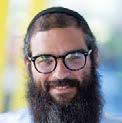
Chizuk
In the height of High Holiday celebrations in autumn of 1978, the Lubavitcher Rebbe suffered a heart attack. Dr. Ira Weiss of Chicago, a renowned cardiologist who had written a textbook on heart rhythm analysis, served as the head of the team of doctors who treated the Rebbe. For years following the Rebbe’s miraculous recovery, Dr. Weiss continued to maintain a close relationship, attending annual farbrengens and closely monitoring the Rebbe’s wellbeing.
One year, Dr. Weiss brought a professional colleague with him, Dr. Gerald Dorros Jr., a world-renowned cardiovascular interventionist from Wisconsin. After the farbrengen and medical consultation, Dr. Dorros had the opportunity of a few private moments with the Rebbe in yechidus. Not knowing what to expect from a deeper conversation with the Rebbe, he was surprised when the Rebbe suggested that the doctor should devote himself to preventative medicine: ‘Consider treating people who are healthy — not only those who are suffering from illness or in need of emergency medical care. You can make healthy people even more healthy.”
“Are we to believe that we can improve on what the Almighty has done?” replied
the doctor with curiosity. “Of course!” the Rebbe responded. “If a layman can’t improve on what the Almighty has created in this world, and if a doctor does not aim to improve on what the Almighty has done, then what are we doing here with our lives?”
Our sedra introduces us to our Torah-defined responsibility in lending a helping hand and issues a prohibition against taking / charging interest on a loan when assist our neighbors and brothers in their time of need:
“If your brother becomes destitute and his hand falters beside you, you shall support him, whether a convert or a resident, so that he can live with you… Do not take interest from him.”
(Vayikra, 25:35-6)
Rashi adds detail in his commentary on the verses:

32 TORAH TIDBITS 1515 / BEHAR BECHUKOTAI
יַחָו בָׁשֹותְו רֵּג ֹוּב ָּתְקַזֱחֶהְו ְךָּמִע ֹודָי הָטָמּו ָךיִחָא ְךּומָי־יִכְו …תיברתו ךשנ ותאמ חקת לא …ְךָּמִע
,ֹומיִקֲהַל הֶׁשָק הֶיְהִיְו לֹּפִיְו דֵרֵּיֶׁש ּוהֵחיִּנַּת לַא ֹוּב ָּתְקַזֱחֶהְו ;דָּיַה תַטֹומ תַעְּׁשִמ ּוהֵקְּזַח אָּלֶא רֹומֲחַה לַע ּוהֵדֹוע ,רֹומֲחַה לַעֶׁש יֹואּׂשַמְל ?הֶמֹוד הֶז הָמְל ןיִדיִמֲעַמ ןיֵא הָּׁשִמֲח ,ץֶרָאָל לַפָנ ,ֹודיִמֲעַמּו ֹוּב סֵפֹוּת דָחֶא :ֹותֹוא TRANSFER YOUR OLD FILM/VIDEO's (All formats) In Quality to Digital Preserve Family History from Fading Michael 052.286.8626 Photography with feeling Facebook.com/L'Dorot Photography
“Do not allow him to fall down and collapse altogether, in which case it would be difficult to pick him up again [from his dire poverty]. Rather, “support him” while his hand is still faltering [for then it is easier to help him out of his trouble]. To what can this be compared? To a load on a donkey-while it is still on the donkey, one person can grasp it and hold it in place. Once it falls to the ground, however, [even] five people cannot pick it up.”
Before someone becomes completely destitute and is in need of a bail-out, rehabilitation, we must strengthen them, and to be דלונה תא האור, ‘ahead of the curve’, anticipating what may happen before it does.
Rambam (Matnas Aniyim, 10:7) provides us with even greater detail:
“There are eight levels in charity, each level surpassing the other. The highest level, beyond which there is none, is a person who supports a Jew who has fallen into poverty [by] giving him a present or a loan, entering into partnership with him, or finding him work so that his hand will be fortified so that he will not have to ask others for a hand-out: ‘You shall support him, the stranger, the resident, and he shall live among you.’ Meaning, support him before he falls and becomes needy.”
Our charge of v’hechezakta bo, “strengthen and support one another” is to do so spiritually as well as materially. This includes offering words of encouragement

OU ISRAEL CENTER 33
הָלֹודְּג הָלֲעַמ .ֹוּזִמ הָלְעַמְל ֹוז הָקָדְּצַּב ׁשֵי תֹולֲעַמ הֶנֹומְׁש ןֵתֹונְו ְךָּמֶׁש לֵאָרְׂשִי דַיְּב קיִזֲחַּמַה הֶז הָּנֶּמִמ הָלְעַמְל ןיֵאֶׁש ֹול איִצְמַמ ֹוא תּופָּתֻׁש ֹוּמִע הֶׂשֹוע ֹוא הָאָוְלַה ֹוא הָנָּתַמ ֹול .לאְׁשִל תֹוּיִרְּבַל ְךֵרָטְצִי אֹּלֶׁש דַע ֹודָי תֶא קֵּזַחְל יֵדְּכ הָכאָלְמ יַחָו בָׁשֹותְו רֵּג ֹוּב ָּתְקַזֱחֶהְו" )הל הכ ארקיו( רַמֱאֶנ הֶז לַעְו :ְךֵרָטְצִיְו לּפִי אֹּלֶׁש דַע ֹוּב קֵזֲחַה רַמֹולְּכ "ְךָּמִע
or guidance, and whatever resources we may have at our disposal. Perhaps someone can benefit from our social currency, our professional introduction, our listening ear or good word, but the main thing is devoting ourselves to the ‘preventative medicine’ of v’hechezakta bo.
Rebbe Moshe Alshich notes that when we are presented with an opportunity to help, we sometimes imagine others with more skills, resources, better connections or greater wealth, to be in a better position to assist. However, in the commandment, ךיחא “your brother” is in דיחי ןושל, singular form. This means your brother or sister, not that of the person with more resources. Our calling is to take others’ potential needs personally, see them as our own brother or sister, and even to imagine that we are the only one able to be of assistance to them. We should not passively assume that others will do our mitzvah for us.
Rebbe Nosson Dovid of Shidlovitz (Sefer Imrei Binah, Parshas Behar), writes:
“When one loves another, he can uplift him spiritually. If one is invited to dine with the king, and replies, ‘I don't want to go unless my friend comes with me’ he
has expressed a deep bond of love, and has manifested the ultimate, inner goal and meaning of the Covenant between Am Yisrael and Hashem. This applies to every Jew. To the degree that a person takes part in manifesting the relationship and strengthening the Covenant between friends and God, he can bring the entire world to perfection.”
Before taking leave of the Rebbe, Dr. Dorros asked one last question: “Are you asking me to attempt to make man a perfect being?” “No,” the Rebbe told him, “that is not what is asked of you.” With a twinkle, he added: “Leave that for Mashiach.”
Dr. Dorros later founded the Dorros-Feuer Interventional Cardiovascular Disease Foundation — and as Medical Director, continues to promote proactive heart health and wellbeing to countless recipients, “making healthy people even more healthy”.
By lifting one another up, and strengthening each other even before we might face an inner or outer challenge, may we merit the restoration — and perfection — of our collective physical and spiritual health, with the coming of Mashiach, soon and in our days.

34 TORAH TIDBITS 1515 / BEHAR BECHUKOTAI
Securities offered through Portfolio Resources Group. Inc., member of FINRA, SIPC, MSRB, SIFMA US BROKERAGE SERVICES IN ISRAEL Get the Best of Both Worlds Keep your money in the US and receive local expert investment advice 02-624-0995 054-599-9530 aaron@lighthousecapital.co.il www.aaronkatsman.com CALL
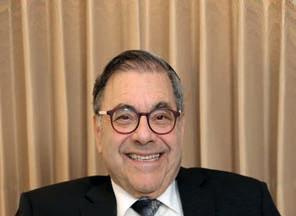
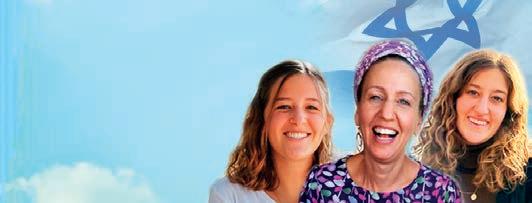

OU ISRAEL CENTER 35
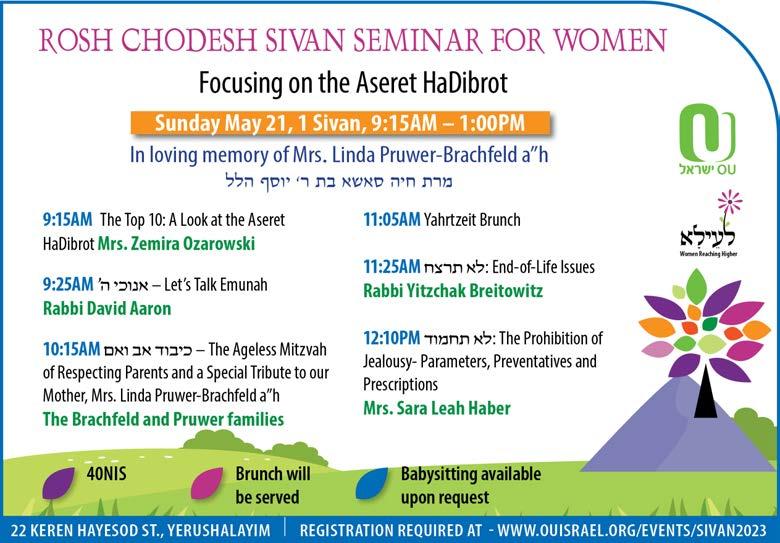
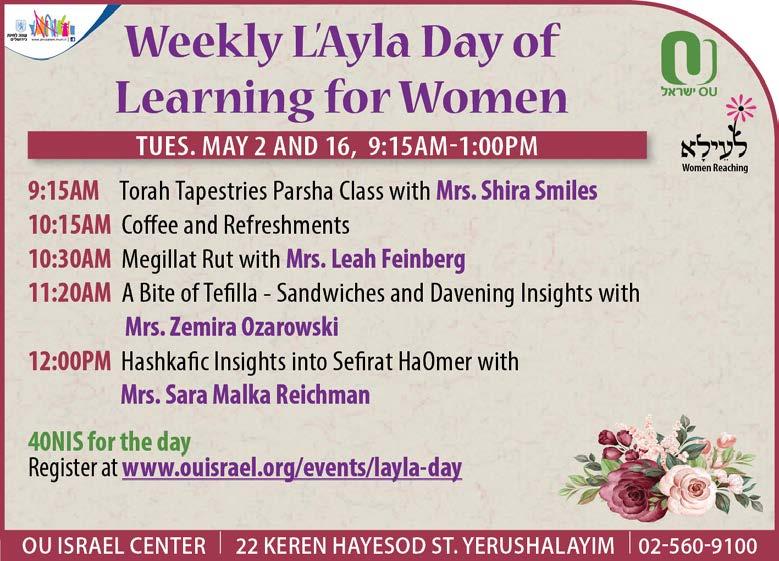
36 TORAH TIDBITS 1515 / BEHAR BECHUKOTAI
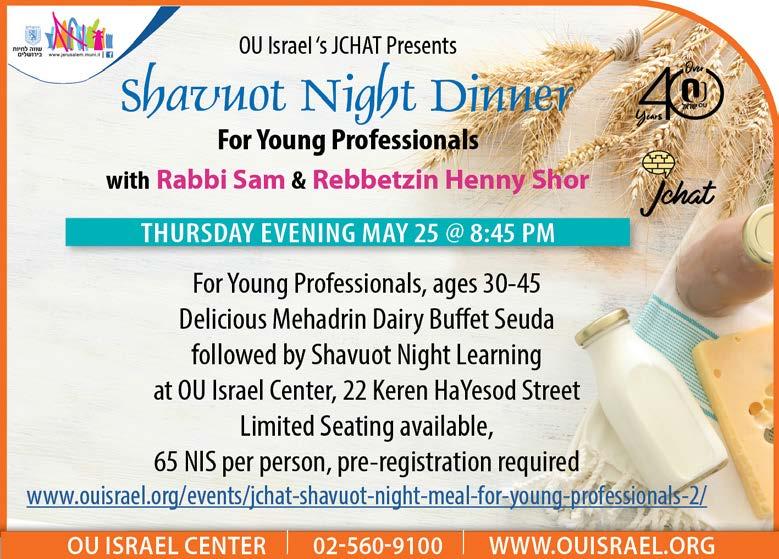
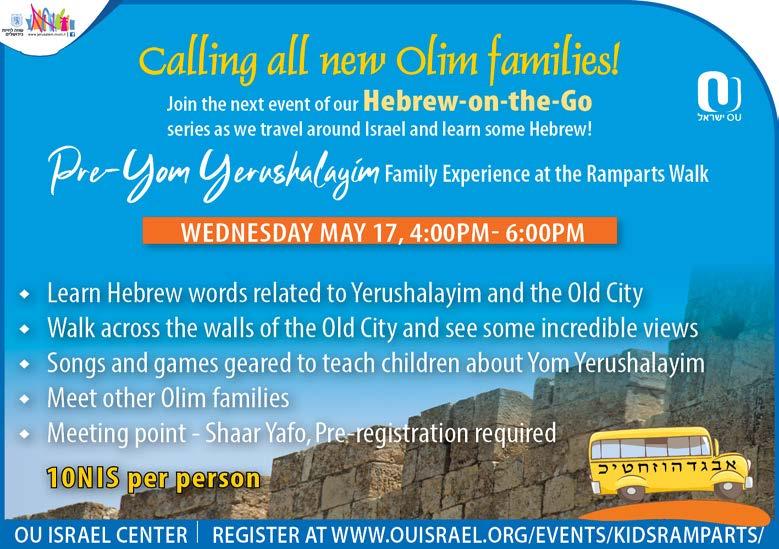
OU ISRAEL CENTER 37
SHIUR SPONSORS
Wednesday, May 3rd - Rabbi Manning’s shiur is sponsored by Mrs. Vivian Brachfeld in loving memory of her brother
ל”ז הדוהי םהרבא ןב םחנמ on his yahrzeit
Monday May 15 - all morning shiurim are sponsored in loving memory of our mother Elaine Mittman
,ה”ע יולה ךורב תב אטיא רתסא on her third yahrzeit - רייא דכ
Bobbie & Heshy Brooks and Arlene Anteby
Thursday, May 18 - All learning today is in memory of Irving J. Abramowitz z”l
ל”ז לדנמ םחנמ עשוהי ןב ףסוי קחצי תמשנ יוליעל
Rabbi Goldscheider’s shiur has been sponsored for the 2023 Academic Year
ל’’ז המלש ןב בוט םשו ה’’ע םהרבא תב םירמ תמשנ וליעל
Rebbetzin Shira Smiles shiur is sponsored for the 2023 academic year by Dr. & Mrs. Menachem Marcus in memory of their parents, Rose & Dr. Emanuel Marcus z”l -
ל”ז סוקרמ השמ ןב יכדרמו ריאמ ףסוי תב לזייר Rosi and Ernest Strauss z”l -
ל”ז סוארטש דוד ןב לאינדו םהרבא תב דומיל
Rabbi Breitowitz’s Tuesday Shiur - Minchat Chinuch is sponsored for the academic year 2023 by Rabbi Refoel & Sharon Auman in memory of their parents Edith & Reiner Auman z”l
ד”יה לאפר תב ה”ע רתסאו ל”ז קודצ ןב הנוי and their son Rabbi Shmuel Eliyahu Auman z”l
י”נ לאפר ברה ןב ל”ז והילא לאומש ברה
Rabbi Goldin’s shiur is sponsored for the 2023 academic year by Dr. & Mrs. Menachem Marcus in memory of beloved aunts
Irma Haas a”h and Hilde Myer a”h
Rabbi Manning’s shiur has been sponsored for the 2023 academic year
ל’’ז ןמלק ןב גילזו ה’’ע תידנרב תב הנרב תמשנ יוליעל Rabbi Taub’s weekly Thursday Parshat HaShavua Shiur is sponsored by The Jewish Legacy Foundation
DOROT - The OU Women's Intergenerational Choir
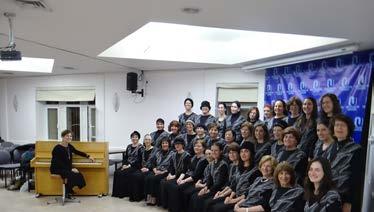
Director Hadassah Jacob 052-384-7230
Monday Evenings 7:00 - 9:00pm
PRI HADASH
WOMEN'S WRITING WORKSHOP AT THE OU ISRAEL CENTER
Monday mornings 10.30-12.30
For more details, call Ruth 02-628-7359 or Judy 054-569-0410
GET FIT WHILE YOU SIT: Exercise for ladies
Join us on Sundays 12:45-1:30pm at the OU Israel Center Sura Faecher 0504153239
Please note:
Deadline for ads for the Shavuot/ Shabbat Parshat Naso issueThursday, May 18th

please email or call Ita Rochel ttads@ouisrael.org/ 02-5609125
SHABBAT AFTERNOON SHIUR WITH RABBI CHANOCH YERES outside the back of the OU Israel Center at 5:15PM
A small Sefer Torah with its own Aron Kodesh is available to shiva houses or for any other necessary occasion on a temporary free-loan basis.
If needed call Uri Hirsch 0545513173
38 TORAH TIDBITS 1515 / BEHAR BECHUKOTAI












































































































































































































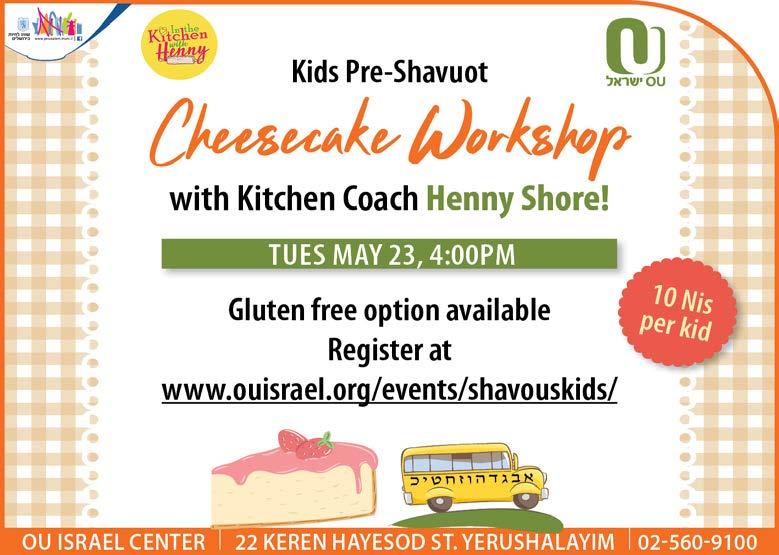
OU ISRAEL CENTER 39 THE ISRAELB ONLINE COMMUNITY Connecting you with fellow Jews, Israel & the Jewish People! n Install the new ISRAELB APP from the google play store to your phones (Dedicated in memory of Elchanan Yosef ben Chaim Eliezer) n Advertise on our new ISRAELB BUSINESS CENTER to gain exposure for your business n We can help you WRITE SPEECHES AND DIVREI TORAH for family events & Smachot n Use IsraelB to ORGANIZE, PROMOTE AND PUBLICIZE your events and Smachot n Use IsraelB to help you SELL OR RENT OUT YOUR PROPERTY CONTACT BENJY SINGER: benjysinger@israelb.org or 053-285-1526 Subscribe to our IsraelB newsletter, follow us on Twitter (@IsraelBayit) and join our Facebook Page & Groups. (Links on IsraelB.org) IsraelB is your resource for jobs, events, community news, shiurim and much more!
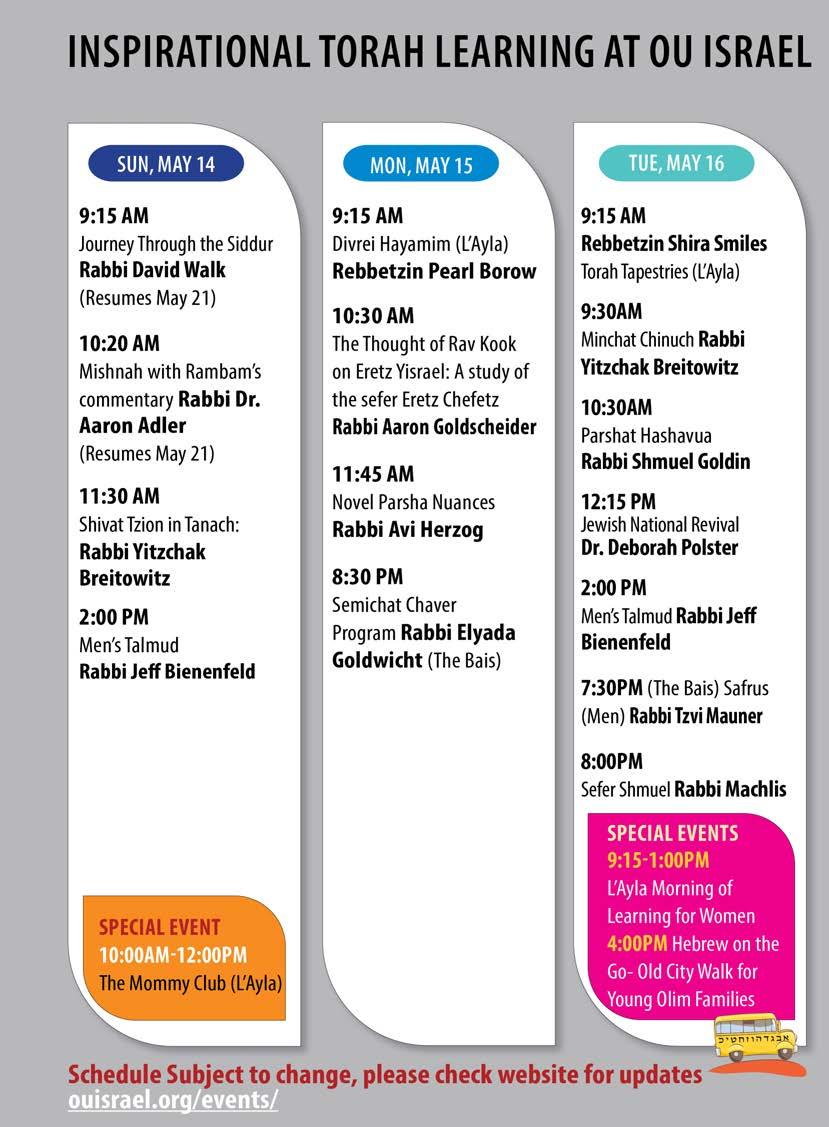
40 TORAH TIDBITS 1515 / BEHAR BECHUKOTAI
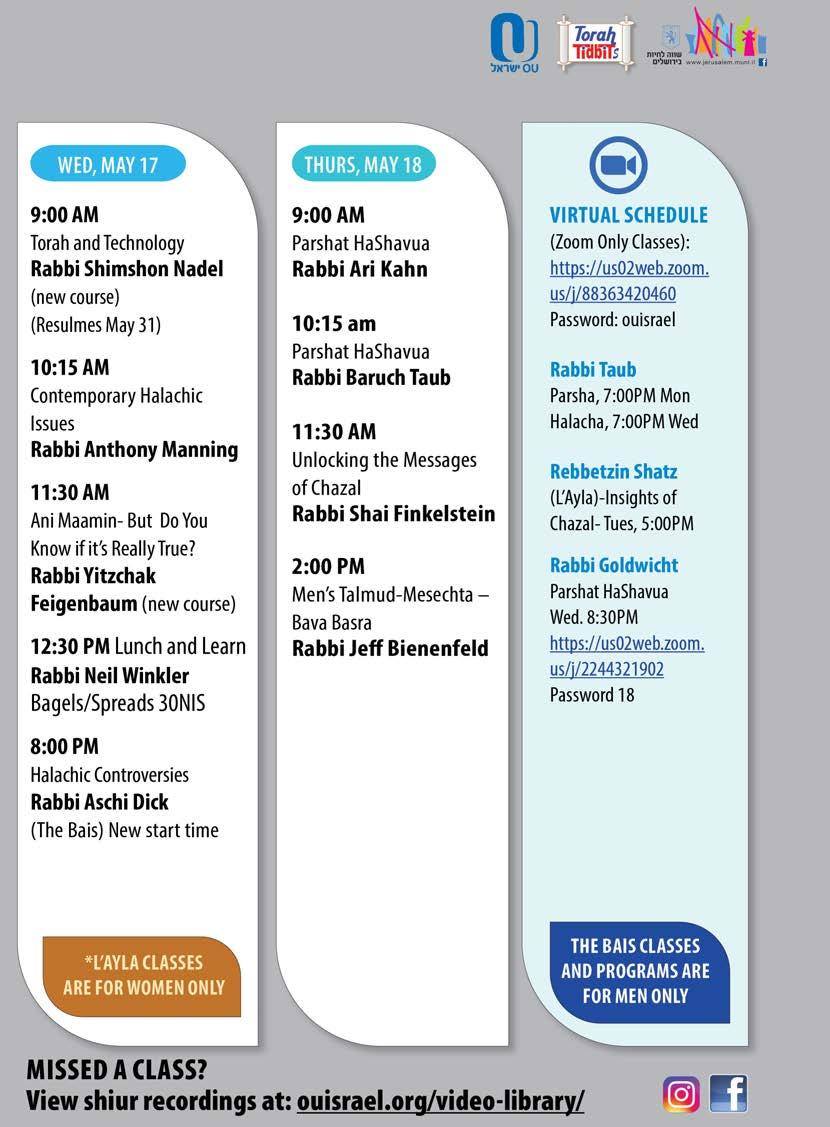
OU ISRAEL CENTER 41
NCSY ISRAEL GIVING DAY
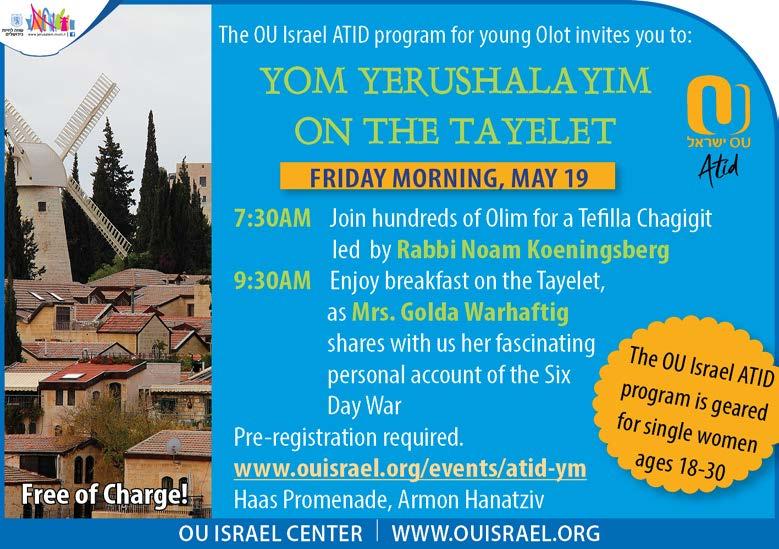



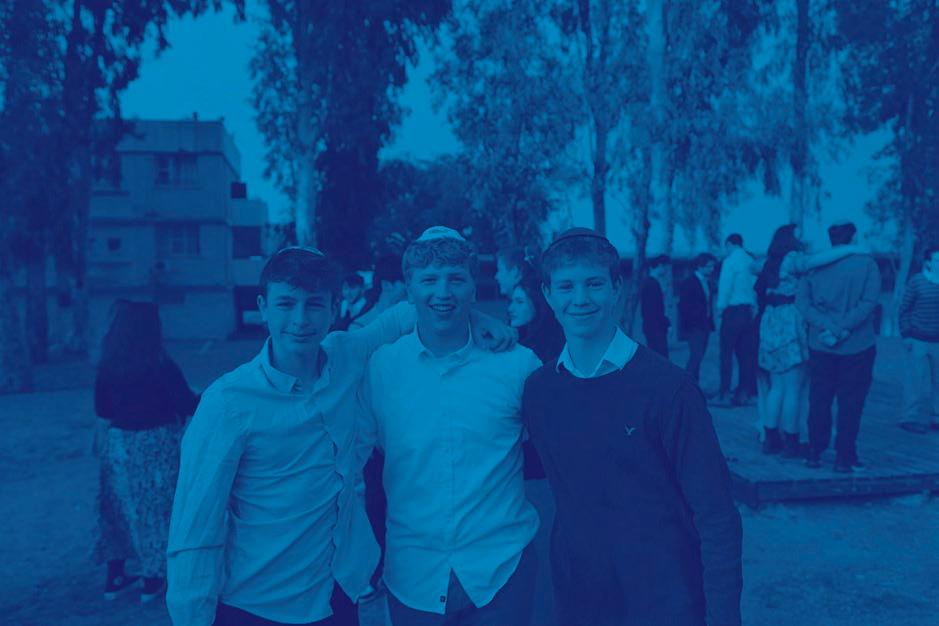
42 TORAH TIDBITS 1515 / BEHAR BECHUKOTAI
JUNE 6-7, 2023
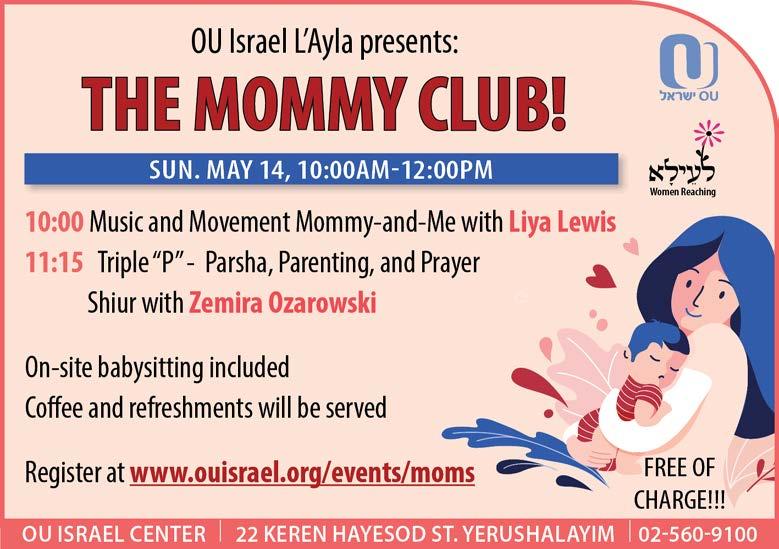

OU ISRAEL CENTER 43
Mon, May 15 , 730 Pm
@OU Israel Center, 22 Keren Hayesod
A call to action:
How to douse the flames of Great Lie of the Nakba
Presenter; Investigative journalist, David Bedein
Author, Genesis of the Palestinian Authority (2017) and UNRWA; Roadblock to Peace (2014)
URGENT TZEDAKAH APPEAL
for very ill, lonely widow woman with no family. Cancer survivor/ serious heart condition. Desperately needs money for basic needs/ medical expenses/place to live.
joanmarastern@gmail.com
Phone 058-778-0691
Endorsed by: Rabbi Zev Leff/Rabbi Yaacov Hillel/ Rabbi Simcha Sheinberg/ Rebbetzin Dena Weinberg/Rabbi Yisrael Gans/Rabbi Dayan Dunner
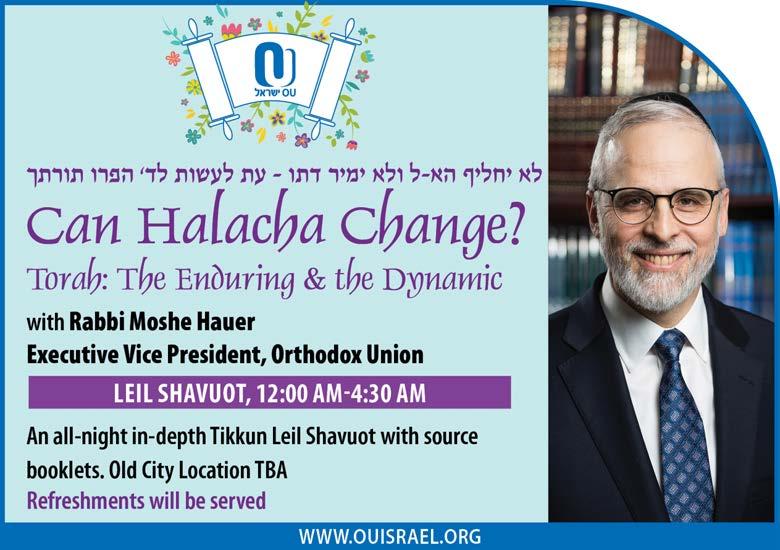

Donations can be sent to:
Rebbetzin Tzipporah Gottlieb-Heller, Neve Yerushalayim Seminary, 1 Beit Yitshak Street, Har Nof, Jerusalem 94130 or to Matat Mordechai Charity, Tax deductible Bank Mizrachi Tefachot. Bank 20. Branch 520, account 128764. Widows account 3649
44 TORAH TIDBITS 1515 / BEHAR BECHUKOTAI
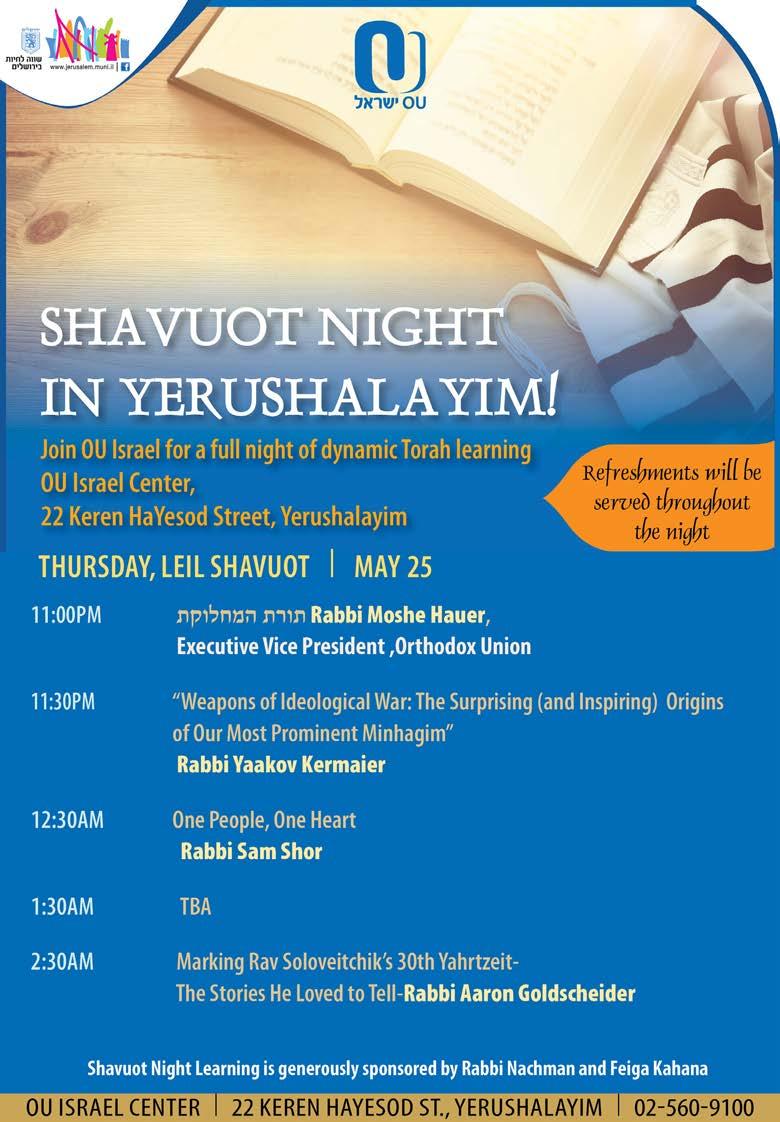
OU ISRAEL CENTER 45

46 TORAH TIDBITS 1515 / BEHAR BECHUKOTAI

OU ISRAEL CENTER 47
SIMCHAT SHMUEL
BY RABBI SAM SHOR Program Director, OU Israel Center
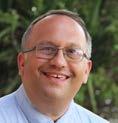
The second of our two parshiyot this Shabbat, Parshat Bechukotai begins with the words:
“Im Bechukotai teleichu,if you walk in my statutes and safeguard my commandments and fulfill them, then I will provide rain at its proper time.”
Rashi, in a famous comment explains the words, Im Bechukotai Teleichu- if you walk in my statutes, to be an instruction to immerse ourselves in Torah- Shetihiyu Ameilim Batorah-to immerse oneself in the labor of Torah.
How are we to understand this insight of Rashi?
In the fifth chapter of Sefer Iyov (verse 7) we read: adam le'amel yulad....A person is born to toil/labor.
The Great Chasidic Master, the Avodat Yisrael of Koshnitz zy'a points out that the word Le'amel-lamed, ayin, mem, lamed is an acronym for the words Lilmod al menat lelamed- to study Torah, in order that we may teach it to others..."
How are we to fulfill the precept to walk in Hashem's statutes? By delving into the Torah's wisdom, and sharing the relevance, morality and beauty of Torah with others.
Rabbi Avraham Borenstein,the Avnei Nezer, the first Rebbe of Sokatchov, zy'a defines this experience of ameilut b'Torah, with these words from the
introduction to his work Eglei Tal.
'The essential definition of immersion in Torah, is that one needs to find fulfillment, and sweetness or pleasantness in that which is being learned...'
Rav Kook, zy'a, in the ninth chapter of Orot HaTorah, echoes these sentiments, and says though it is important that a person strives to achieve basic fluency and fundamental knowledge of all areas of Torah wisdom, it is important to recognize that as individuals each of our souls may be drawn more to a particular area of Torah study. True ameilut, is to find those areas of Torah wisdom that most resonate with our hearts and souls, and to let the sweetness of that wisdom permeate our entire being.
Yehi Ratzon, that each of us may find that chelek in the Torah HaKedosha within which our neshama may truly experience that matikut, the sweetness of Torah, and be blessed to share the sweetness of Torah with one another....
48 TORAH TIDBITS 1515 / BEHAR BECHUKOTAI
Flying Soon? Travel with Confidence 1UniTravel - Medical Insurance at great prices Choose from multiple options 1unitravel.brokersnexus.com 1UniSim - Sims for USA and Worldwide Starting at $40 sales@1unisim.com Call 077-400-3199 or USA 718-715-0001
CARDO PROPERTIES FOR



Rechavia - Keren Hayesod St., 3-bedroom unfurnished apt. available for rent starting immediately, 2nd floor, dining area, good condition, 2 bathrooms, 1 shower, balconies, excellent location, near public transportation
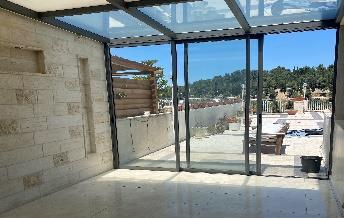

Asking: 8500nis/month

CALL: 052 2604394

OU ISRAEL CENTER 49 Gilinski Real
gilinski.co.il City Center Penthouse, duplex,
SQM,
terraces, renovated, parking. #052-6984466 13,000,000 NIS Rehavia 4R, 100 SQM, 7th floor, shabbat elevator, parking, storage, views to park & Knesset! #050-7225694 German Colony Cottage,
garden, private
parking. #052-6503348 3,490,000 NIS 6,200,000$
Estate
9R, 340
2
new, 5R, 150 SQM, 100 SQM
entrance,
RENT IN THE CITY CENTER
GEULAS YISRAEL
BY RABBI MOSHE TARAGIN R am, Yeshivat Har Etzion
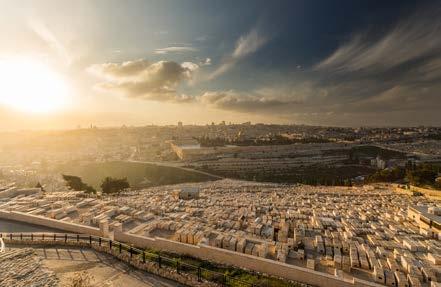
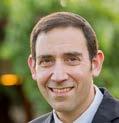
Six for Six: How the World Changed in Six Days
The actual state of Israel was established 75 years ago in 1948. However, the modern state of Israel as we know it, was launched in 1967. The six-day war was so revolutionary and so transformative, that in many ways, it was more groundbreaking than 1948. Thousands of years ago, Hashem created our natural world in six days. Fifty-six years ago, during the week before Matan Torah, He reshaped history in six quick days. Here is a list of the six major revolutions which occurred during those six days in June
Six for Six.
The Biblical Corridor
In 1948, we were graciously “permitted” to return to a carved-up parcel of our ancient Homeland. After the shock and horror of the
Holocaust, our return to Israel soothed the world’s conscience and, additionally, solved the thorny issue of unwanted and “undesirable” Jewish refugees. By contrast, in 1967, we returned to the Biblical corridor – a passage of land which cuts through the heart of Israel and the heart of Jewish history. This territory stretches from Shechem in the north, snakes its way through Jerusalem, bends toward Beit Lechem and Chevron, finally passing through Be’er Sheva in the south. Jewish history and sefer Bereishit, emerged in these lands, and our return to this passageway signaled the resurgence of our people and the reconstitution of redemptive History. Jews living in the Tanach provinces signal the acceleration of history in a manner that the important, but indefinite miracles of 1948 did not.
Emergent Superpower
Conditions in Israel between 1948 and 1967 were harsh and unforgiving as our country was riddled by food rationing, numerous wars of attrition, and stifling diplomatic isolation. In 1948, our nascent and beloved state provided a respite from the tumultuous and tragic years of the Holocaust,
50 TORAH TIDBITS 1515 / BEHAR BECHUKOTAI
YOM YERUSHALAYIM
and fulfilled a centuries-long dream of resettling our Homeland. However, life continued to be arduous, and conditions were austere. The miracles of 1967, the courage of our soldiers, and, of course, the palpable Divine intervention created a swell of national pride or תויממוק which transformed the fabric of Israeli society.
Ironically, the War of Independence in 1948 is sometimes referred to as the war of komemiyut because, for the first time in thousands of years, Jews defended themselves from military aggression. In truth, the miraculous events of 1967 established far greater komemiyut than the ambiguous victory of 1948. The restoration of our national pride began in 1967 and since this watershed moment we have emerged as a military, economic, agricultural, medical, water, energy, and, of course, high-tech superpower. This little country of the Jews is certainly responsible for an outsized portion of modern human welfare. This is part of the redemptive arc and 1967 launched this era of Israeli confidence and innovation. As Artificial Intelligence and laboratory manufactured food revolutionize our world, it is likely that we will continue to lead Mankind into this unknown future.
Flocking Home
The return to Yerushalayim and the surrounding environs stoked international Jewish interest in returning home. Prior to 1967, much of the emigration to Israel consisted of “distress Aliyah”- Jews fleeing persecution from Arab countries. Between 1948 and 1967 the financial hardships in Israel were so severe that more people emigrated from Israel than to Israel. That all

OU ISRAEL CENTER 51
changed in 1967. The magnetizing effect of Yerushalayim as well as the slow but steady economic improvement in Israel drew the interest of Jews from across the globe. Many made aliyah and still more became more embedded in Israeli life, purchasing real estate or increasing their frequency of visits. The worldwide Jewish interest in Israel spiked after 1967. Jews in New York, London, and Paris became shareholders in our joint project of historical reconstruction.
Diplomatic Acceptance
Prior to 1967, Israel was a diplomatic pariah. Despite the broad support afforded us during the UN votes of the late 1940s, we were soon plunged into diplomatic isolation. Much of the third world was aligned with Arab interests and, also, was deeply influenced by the Communist bloc which
077-2050015
052-2678749
golanechasim@gmail.com
Rasco: new 4 room apartment, 95m, master suite, elevator, balcony, very nice 2,950,000 NIS
split, bright, airy, sukkah balcony facing a magnificent panoramic view, 3 exp Shabbat elevator, parking, 3,290,000 NIS
Old Katamon: Spacious 3-room apartment in a very quiet street, 75 sqm, sukkah balcony facing a green and pastoral view, 3 exp. Shabbat elevator, private parking, storeroom, 2,690,000 NIS
Arnona: 4-room apartment, 90m, beautifully renovated, master suite, balcony, storage, Shabbat elevator, private parking 3,250,000 NIS
Baka: New 4 room apartment in a new building, 88m, master suite, storage, Shabbat elevator, private parking, 3,950,000 NIS

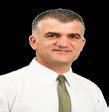
Rechavia: 4-room apartment, 92m, Suka balcony, Shabbat elevator, fully accessible, private parking, storage 4,400,000 NIS
Arnona: 5-room apartment, 120m, balcony, elevator, fully accessible, private parking, storage 4,350,000NIS
Baka: 5-room garden apartment, 140m, master suite, private parking, storage, full of light and airy, nice garden, 5,000,000 NIS
Old Katamon: Spacious new 5-room penthouse, 155m, terrace, great panoramic view, underfloor heating, Shabat elevator, 2 parking, + rental unit, 8,900,000 NIS
For rent: Baka: nice 4-room apartment, 82m, beautifully renovated, master suite, a/c, balcony, 2nd floor, elevator - fully accessible, storage, 7,800 NIS
enjoyed spheres of influence in Europe, China, and parts of Latin America. This joint Communist and third-world bloc routinely exhibited diplomatic hostility toward israel.
Though we enjoyed broad diplomatic support in Europe and the United States, militarily, we were still isolated. The US arming of Israel began in earnest only after our military victory in 1967. During the war of 1967, we literally stood “alone” on one side of the river, facing off against an entire world; we had assumed the role of our ancient grandfather, Avraham, who had also opposed an entire world of idolatry.
As our mission is to inspire an entire world, international acceptance of Israel is a crucial element of that vision. Though full embrace of the Jews in their Homeland will only be achieved when history ends, the slow but steady diplomatic progress over the past twenty years is part of our redemptive advance.
Religious Revival
The legendary scenes of Israeli soldiers sounding the shofar while standing at the newly liberated Kotel galvanized an entire people. Witnessing Hashem’s explicit intervention in the historical process prompted a revival of religious sentiment. Over the past 50 years Israel has rightly established itself as the epicenter of worldwide Torah study. The euphoria of 1967 launched the National Religious Torah world, which, alongside the Charedi Torah world, has dramatically augmented the spread of Torah study.
1967 didn’t just stimulate Torah study and Orthodox behavior. The original culture of
52 TORAH TIDBITS 1515 / BEHAR BECHUKOTAI
Meir Golan
Meir Golan Old Katamon: 4-room apartment in a small and quiet street, 101 sqm, renovated, very bright and airy, master bedroom, Safe room (mamad), sukkah balcony, view, elevator, 3,400,000 NIS Old Katamon: 4-room apartment, 90 sqm, well
is reluctant to send Yishmael away and Yitzchak seeks reconciliation with Yishmael and seeks to bless Esav.

Israel and of the founders of Zionism was highly secular and even anti-religious. It is no wonder that so many Orthodox Jews were unable to endorse a redemption which was masked in such animosity to religion. Since 1967 Israel has witnessed a revival of ‘traditionalism’ as a large majority of non-Orthodox Israeli Jews identify as “Masorati”. They may not adhere to strict halachic regulations, but they do believe deeply in Hashem and in His historical mission for His people. 1967 altered the religious landscape of Israel, both by animating Torah study and by relandscaping the secular demographic.
6th Aliya (25:1-11) Avraham marries Keturah; they have 6 sons. All that Avraham has goes to Yitzchak; these are sent eastward with gifts. Avraham dies at age 175; he is buried by Yitzchak and Yishmael in Ma’arat Hamachpelah. Yitzchak is blessed by G-d: he lives in Beer L’chai Roi. The transition from Avraham to Yitzchak is complete. While G-d has been a silent partner in this parsha, here He completes the generational transfer – He blesses Yitzchak. The Jewish people will be Yitzchak and not Yishmael.
Jewish Confidence Index

is to emphasize that the Torah is not as interested in the history of power as in the history of the covenant of G-d with the Jewish people. And that will be told at great length.
HAFTORAH CHAYEI SARAH
1 KINGS 1: 1-31
The theme of this week’s haftorah echoes the theme in our parsha which mentions both the death of Sarah and Avraham. King David was an older man and a woman was assigned to him to serve him and provide warmth.
7th Aliya (25:12-18) The generations of Yishmael are enumerated. Yishmael dies. His descendants dwell from Egypt to Assyria. Yishmael’s story is brief. He has numerous and powerful offspring. The brevity
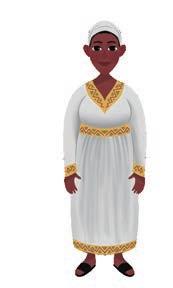
A SHORT VORT


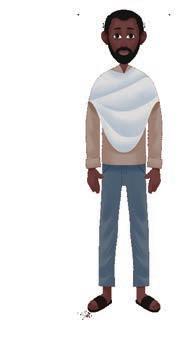
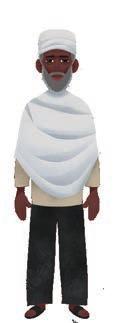
Over the past fifty years, Jews across the world have become more engaged in local governance, culture and society. Previously, Jews lived along the margins of society and were barred from prestigious schools, law firms and country clubs. Modern Jewish communities display more confidence and participate more extensively in local society than previous generations. Much of this confidence stems from the komemiyut achieved in Israel during the 1967 war. Knowing that we have constructed a strong and successful Jewish state feeds Jewish confidence across the globe.
Adoniyahu, one of King David’s sons, began to prepare for ascension to his father’s throne. This was despite the fact that King David expressed his wishes that his son Shlomo succeed him.
Adoniyahu convinces two very significant personalities - the High Priest and the commander of King David’s armies - to
BY RABBI CHANOCH YERES Rav, Beit Knesset Beit Yisrael, Yemin Moshe
When Avraham addresses the people of Cheit, trying to acquire a burial spot for his wife, he says “Ger V’Toshav Anochi Eimachem” (23:4) “A Stranger and a Resident am I with you” This seems to be a contradiction. If one is a stranger than he is not a resident, if he is a resident than he is no longer a stranger. What did Avraham mean?
The Magid of Dubno (Jacob ben Wolf Kranz 1741-1804) explains that Avraham watched how he spoke in this tense situation in order to, both, state his truth and be able to keep the peace -Shalom Bayit. Avraham said, on the one hand, “I am a Resident’ due to G-d’s promise to receive this Land and on the other hand, I still need your agreement to purchase a plot. In other words, Avraham implied “I am the resident” and you are the “strangers”, while they understood him as saying that “they” are the residents and Avraham is the stranger. The peace was kept, and Avraham remained true to his ideals.
Six days and six seismic shifts in Jewish history. We eagerly await the seventh day of history. That day will be Moshiach and will feel a lot like Shabbat, the original seventh day.
Shabbat Shalom
We are a young senior couple looking for a 1 bedroom furnished apartment in Jerusalem from December 2021-June 2022

0524419731
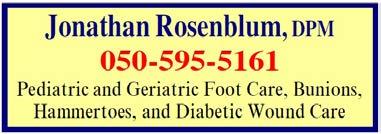
OU ISRAEL CENTER 53
12 TORAH TIDBITS 1440 / CHAYEI SARA 5782
לארשי
לארשי ץראל עסמה
ץראל עסמה
Editor, Torah Tidbits
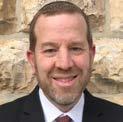
Spiritual Vitamins in the Food of the Land
The purpose of remembering Jerusalem [when reciting] ‘Al naharot bavel,’ and ‘Shir hama’alot’, at every meal is in order that we yearn for the Land of Israel, in close proximity to eating. This serves to enhance the food outside the Land of Israel and brings it closer to the heights of Israel.
Even in the Land of Israel in this time, when there is a diminished holiness due the destruction [of the Temple] and there is increased physicality, in proportion, in its food - still, there remains substantial spiritual content [in the food] in proportion to the longing for the redemption, which we accentuate by [reciting] the Psalms, which introduces the Blessing of the Land and [the blessing] of ‘Rebuilding Jerusalem’ in Birkat Hamazon (The Blessing After the Meal). (Eretz Chefetz 4:10)
The notion that there is holiness found within food is an idea espoused by the kabbalists and underscored in Chassidic thought. Rabbi Dr. Abraham Twerski zt”l elucidates this esoteric concept:
“Chassidic writings raise the question: Inasmuch as the foods we eat provide only physical nutrients, where does the neshama get its nutrients? They answer that in every physical object there is a spark, a nucleus of kedusha and Godliness, which enables the object to exist. This nucleus of divinity that is within the food is the nutrition of the neshama.
Just as physical digestion is dependent on the presence of certain enzymes that convert the food into the body’s necessary building blocks, so is the absorption of the nucleus of kedusha that is within the food dependent on the spiritual “enzymes.'' These are the berachot that proceed consumption of food, whereby one invokes the name of God as one thanks Him for the food. Similarly, sharing words of Torah at the table enables the neshama to extract the spark of kedusha in the food and absorb it (Visions of the Fathers, Twerski, pp. 149-150).
Evidently, Rav Kook is suggesting that reciting these chapters of Psalms at the conclusion of the meal have the ability to extract the sanctity that is embedded in Eretz Yisrael.
Perhaps an additional dimension to Rav Kook’s teaching can be found in the following explanation from Rabbi Twerski: “Chassidus teaches that retrieving the sparks of Godliness that are dispersed within the physical world hastens the ultimate Redemption of Israel. Think of it! A
54 TORAH TIDBITS 1515 / BEHAR BECHUKOTAI
RABBI AARON GOLDSCHEIDER
person has the extraordinary power of hastening redemption by eating properly” (Ibid, p. 150).
The Source for Reciting Psalms with Birkat Hamazon
What is the source for the custom of reciting the Psalms, Al Naharot Bavel (Tehillim 137) and on Shabbat and Yom Tov Shir Hamaalot (Tehillim 126) before Birkat Hamazon?
The Zohar states (Terumah p.154 b) that if one derives pleasure from bread and delights in given foods, he is required to remember and worry over the sanctity of the Holy Land and over the Palace of the King which is in ruins. So on weekdays we recite, “There we sat and also wept when we remembered Zion.” On Shabbos and Yom Tov when it is prohibited to openly display grief, we say a joyful psalm instead: “When Hashem returned the captivity of Zion, we were as dreamers” (Shelah, p. 82b).
The Zohar is suggesting that we read these verses to temper our joy by remembering the loss of the Temple. Rav Kook, however, seems to emphasize something different. He sees the positive effect in reading these Psalms. When we concentrate on the Land while engaging in eating we ennoble the act of eating - and amazingly, we even elevate the spiritual content of food itself. The result is bonding with the spiritual quality inherent in the Land simply by reciting words that focus on the Land.
A Halacha Regarding Sparks of Kedusha Found in Food
The Tur specifies the correct text that should be recited following the consumption of the seven species of the Land of Israel (Tur, Orach Chaim 208). He states that the
words: ve’nisboa mituva הבוטמ עבשנו (to be sated with its goodness) should be omitted from the blessing of Al Hamichya. This phrase connotes that we are eating only in order to enjoy the pleasure of the Land’s food. This emphasis, suggests the Tur, has no place in the blessing. Perhaps the Tur is alluding to the Talmud (Sota 14b) where it notes that Moshe’s desire to enter the Land was not for the purpose of enjoying its sustenance. Why should we make mention that the food is tasty when that is not our focus?
The commentary of the Bach counters and suggests that this phrase is indeed correct because it does not relate to the physical nourishment or superior cuisine in the Land but rather to the sparks of Godliness found in its produce. This message, he argues, should certainly be highlighted in the blessing.It is noteworthy that it is our practice today to include the words “to be sated with its goodness.”
The legendary Chatam Sofer suggests that the Torah’s praise of Israel as being a “Land flowing with milk and honey” is actually meant to underscore the spiritual content found in all the produce in the Land of Israel. We use a similar expression to describe the sweetness of the Torah - “Honey and milk under her tongue” (Song of Songs 4:11). The concept that holiness is found in the food is hinted at in the following way: The final letters (sofei tevot) of the words - zvat chalav u’devash
שבדו בלח תבז- spell the word Shabbat. The Chatam Sofer concludes: ‘Partaking of the food of Israel is compared to partaking of a Shabbat meal’ (Chatam Sofer, Chiddushim on Chullin, 71b).
OU ISRAEL CENTER 55
BY REBBETZIN DR. ADINA SHMIDMAN INSIGHTS


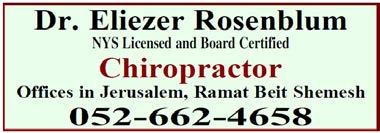
REBBETZIN SHIRA
the Posuk in our Haftorah,

SMILES Faculty, OU Israel Center
Heal me, O LORD, and let me be healed; Save me, and let me be saved; For You are my glory. (Yirmiyahu 17:14)
Tribute to the Trio
In a deeply powerful scene, Moshe Rabbeinu is found with his hands held high on top of the mountain praying for the people gripped in a raging battle with Amalek below.
The words of Yirmiyahu are familiar to us as they are used as the basis of the bracha of Refainu in our daily Shemoneh Esrei. Our Sages reformulated the personal request of Yirmiyahu to reflect the beseeching of a community asking for healing. These words resonate so deeply during these times. We’ve faced a pandemic with unprecedented illness and loss and continue to turn to Hashem in prayer to cure our friends and family and heal our world.
Ahron and Chur stood on either side of Moshe Rabbeinu holding his hands aloft (Shemot 17;10). Rashi teaches that Chur was the son of Moshe’s sister, Miriam. What more do we know about Chur?
, heal me and I shall be healed, as well is in other places (e.g, Tehillim 147:3). Rabbainu Bachaya explains that the ּפ (Pey) is a harsher sound, suggesting that medical treatment often can be difficult and painful. The dot in the ּפ (Pey) alludes to the pricking and poking, the invasive acts that often must be done in order to cure illness. By contrast, when G-d heals us, the letter used is פ (Fey) which is a softer sound. We ask Him to heal us gently and kindly and use measures that are as unobtrusive as possible.
These words,
What is the symbolism of his joining with Ahron to support the hands of Moshe Rabbeinu?
Rabbi Roberts in Through the Prism of Torah explains that Ahron and Chur personified contrasting character traits. Ahron was a peacemaker, he constantly looked for ways to create harmony among his people. Indeed, he was ready to compromise his own values to achieve this goal, as we see in the story of the sin of the golden calf. Chur,
Rabbeinu Bachaya makes an interesting observation as he explains the words in the verse in Shemot 21:9, אֵּֽפַרְי אֹּפַרְו, and he shall surely heal. This verse sanctions man to heal another human being. While the root (א-פ-ר) is the same in both Shemot and in our verse in Yirmiyahu, there is a slight difference in the words. In Shemot and in other places in Tanach (e.g., Yirmiyahu 51:9), when discussing man’s treatment of the sick, the letter ּפ (Pey) is used. However, when we request that Hashem heal man, the letter פ (Fey) is used as seen in
on the other hand, was a person who stood strong in his values, unbending and resolute in his beliefs. Chazal teach that Chur tried to challenge the people when they wanted to build the calf and they subsequently killed him. Chur, a descendent of Yehudah, was a person who was inflexible and strong like a lion. Truly, a combination of both qualities is necessary. In interpersonal relationships it is wise to follow Ahron’s path, to compromise and make peace whenever possible. However, in the service of Hashem and reinforcing kevod shamayim, one needs to follow Chur’s example and be resolute in his values. These two special people joined Moshe Rabbeinu to activate the merits of these approaches as he implored Hashem to have mercy on His people and vanquish Amalek, physically and spiritually.
,” Heal me, O L-rd, and let me be healed; Save me, and let me be saved; For You are my glory, are used in our daily Tefillah. We beseech Hashem at this time, and always, that He will cure those who are ill with His love and kindness, that the sick won’t have to suffer needlessly and that our world is cured from illness for all time.
For Sale - Gorgeous apartment in Old Katamon
In a unique Old Arab style building - Spacious 110sqm, 4 room apartment with Sukah balcony, Shabbat elevator, parking & large separate storage room. lots of character, excellent condition, central A/C Truly one of a kind! 5,280,000nis
For Sale – Old Katamon, Negba st., 1st floor, Arab house, 4 rooms, (total about 160m), high standard of renovation, Sukkah porch, 2 full bathrooms + guest bathroom, central a/c, elevator, parking, small machsan, asking $2,550,000
56 TORAH TIDBITS 1515 / BEHAR BECHUKOTAI
׃הָּתָֽא יִתָּלִהְת י ִּכ הָע ֵׁשָּוִאְו יִנ ֵעיִׁשֹוה א ֵפָר ֵאְו ה יִנֵאָפְר
HAFTORAH
ֵאְו ה יִנֵאָפְ ר
אֵפָר
“הָעֵׁשָּוִאְו יִנ ֵעיִׁשֹוה א ֵפָר ֵאְו ה יִנֵאָפְר הָּתָֽא יִתָּלִהְת י ִּכ
Rebbetzin Dr. Adina Shmidman is the founding director of the Orthodox Union Women’s Initiative and the rebbetzin of the Lower Merion Synagogue in Bala Cynwyd, PA.
26 TORAH TIDBITS / BESHALACH 5781
In the heart of calm and pastoral BAKAPrivate arab house, 6 rooms, 500m + possibility of building 250m, huge garden, approx. 700m, completely renovated, underfloor heating + a/c, large parking, 5 bathrooms, 5 toilets, green
MENDEL 0528980111
BAKA - New penthouse, 4 rooms in a small luxurious building with character, alone upstairs, 3rd floor + elevator, 4 orientations, 3 toilets, 2 bathrooms, terrace / sukkah, 70m, parking, store-room

5450000 NIS MENDEL 052-8980111
MOSHAVA / In a building after TAMA 38, new apartment, 4 rooms, 3rd floor + elevator, balcony/partial sukah, opened sight, 2 bathrooms, calm, parking

MENDEL 052-8980111
BAKA / MEKOR HAIM - 4 rooms, 90m, 2nd floor + elevator, completely renovated, fireplace, a/c, gas heating, very central, close to all amenities
MENDEL 052-8980111
Near Arnona Hatzaira, in a step building, very large 5-room apartment + balcony/sukkah, 40m, renovated, 3rd floor, private entrance, quiet, potential for extra independent unit
MICHAEL 052-3202488
ARNONA – 3 rooms, that will be transformed to 90m, 3rd floor with elevator, store-room, parking
ONLY 2550000 NIS
MICHAEL 052-3202488
In the pastoral BAKA - quiet and central, stunning villa 350m, in a magical atmosphere, designed, pool, 4 bedrooms, cinema room and more, 4 bathrooms, garden, parking
MIKAEL 052-3202488
ARNONA HATZEIRA - Very spacious penthouse, 120m, 4th floor + elevator, huge terrace / succah, 75m, open view, 2 parking spaces, cellar, 3 toilets, quiet, completely renovated, immediate entrance
MICHAEL 052- 3202488

OU ISRAEL CENTER 57 5/1/23, 5:56 PM gedaliahgoldstein.png https://drive.google.com/drive/u/0/shared-with-me 1/1
FROM THE VIRTUAL DESK OF THE OU VEBBE REBBE
 RAV DANIEL MANN
RAV DANIEL MANN
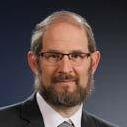
Rearranging Aliyot to Enable a Levi’s Aliya
Question: This Shabbat (Vayakhel/ Pekudei), the gabbai called up a levi for shvii, and as ba’al korei, I knew he was going to make a hosafa and give acharon/ chazak to someone else. I quickly told him the levi cannot come up, but that they should switch the intended olim, having the levi wait for acharon. After laining, someone suggested we should have relied on the Sephardi minhag that kohanim and levi’im can have aliyot after the first three. Who was right?
Answer: The reason a levi gets the

second aliya is to honor his status, which is lower than a kohen’s and higher than a yisrael’s (Gittin 59b). Once there is a hierarchy, giving a kohen or a levi a lower than prescribed aliya, especially giving an aliya after another “tribesmen” can give the impression that one of them is disqualified from his status (see ibid.).
All agree that the three aliyot during the week and the first three of Shabbat and Yom Tov morning are given to kohen, levi, and yisrael, in that order. According to Sephardi practice, starting with the fourth aliya, we can give aliyot to kohanim and/or levi’im, as long as it is not to two in a row and that when we call them, we announce “… even though he is a kohen” (Shulchan Aruch, Orach Chayim 135:10). The Rama (ad loc.) says that Ashkenazi minhag is that they cannot get aliyot until after the required seven. However, Ashkenazi minhag has changed somewhat: kohanim/levi’im do not get even hosafot except for maftir and acharon, but they can be even back-to-back (Mishna Berura 135:36, based on the Levush). On the side of leniency, even if acharon is one of the seven, the importance of its finishing the reading makes it appropriate for kohanim/ levi’im (ibid.).
The Taz (OC 135:9) points out the “self-fulfilling prophecy” element of these matters. If the rule is that a certain aliya is appropriate for a kohen/levi, then receiving it cannot
58 TORAH TIDBITS 1515 / BEHAR BECHUKOTAI
תמשנ יוליעל ל"ז ןמצלז לאיזוע םהרבא ןב םירפא לאוי Gemach for Chatan and Kalla: Meals for wedding and Sheva Brachot at cost Eida Hachareidis Hechsher Tel:052-633-1744 gadgadood@gmail.com
The Orthodox Union - via its website - fields questions of all types in areas of kashrut, Jewish law and values. Some of them are answered by Eretz Hemdah, the Institute for Advanced Jewish Studies, Jerusalem, headed by Rav Yosef Carmel and Rav Moshe Ehrenreich, founded by HaRav Shaul Yisraeli zt”l, to prepare rabbanim and dayanim to serve the National Religious community in Israel and abroad. Ask the Rabbi is a joint venture of the OU, Yerushalayim Network, Eretz Hemdah... and OU Israel’s Torah Tidbits. cast aspersions on them. This observation helps justify Sephardic leniency but makes it more difficult (while still possible) for Ashkenazim to rely upon the lenient opinions, when in the shul at hand, it is not an aliya that kohanim/levi’im receive. In your case, since the previous levi received an aliya long before, aspersions will not go back onto him (see Beit Yosef, OC 135). However, in general, we do not leave it up to the kohen/levi to decide if they are willing to put up with possible aspersions upon themselves.
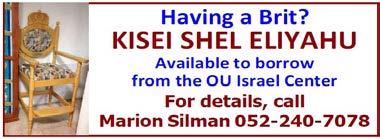
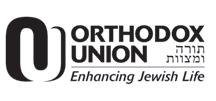

On the other hand, Halacha does consider other factors in this matter, including the embarrassment of coming up for the aliya and not being able to receive it (see Mishna Berura 135:35). (It is not fully clear if the embarrassment begins in earnest from the time one’s name is called and he is thus expected to get up (see Berachot 55a), or only when he stands by the bima – see ibid. and Mor U’ketzia to OC 135). Yet, classical poskim do see your solution, of giving him a subsequent aliya, as a good remedy to embarrassment. The Shulchan Aruch (ibid. 6) says that if a yisrael was called for the first aliya due to absence of a
kohen and then a kohen comes in before the yisrael begins the beracha, the yisrael waits at the bima until he can get the aliya. The Mishna Berura (ibid.) embraces that idea for our general case. So what you did was an excellent way to deal with the situation, and better than ignoring our minhag of not giving aliyot before acharon.
There may have been other viable possibilities. Even if the yisrael was informed about his aliya, until he is called up, nothing firmly binds the shul to give him one. Of course, decency calls for keeping one’s word (see Bava Metzia 49a), but mistakes or changed circumstances can legitimize asking the yisrael to forgo his expected aliya and “compensating” him in the future. (Which idea was better might depend on a quick appraisal of who is likely to be insulted.) If it was important to give chazak to the yisrael, it was possible to give maftir to the levi (when it is fine to split the berachot and the haftara reading is a good question – see Rama, OC 284:4; Ishei Yisrael 38:56).
OU ISRAEL CENTER 59 Having a dispute? For a Din Torah in English or Hebrew contact ‘Eretz Hemdah - Gazit’ Rabbinical Court: 077215-8-215 • fax: (02) 537-9626 beitdin@eretzhemdah.org
donated by Marion & Michael Silman Ita Rochel 02-560-9125
INSTITUTE BY RABBI MOSHE BLOOM en.toraland.org.il

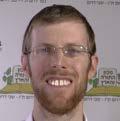
The Chadash Prohibition #3: Current Situation in Israel
Two weeks ago I recounted how I saw Brooklyn bakeries advertising kemach yashan and asked why we don’t see such signs in Israel.
We do see kashrut certificates for baked goods and bakeries in Israel featuring “challah was taken,” “no concern of tevel” and “terumot and ma’aserot were separated,” but not “kemach yashan” or “no concern of chadash.” Why not? Last week we discussed the posekim who maintain that it is a rabbinic prohibition outside of Israel and are therefore lenient. However, posekim agree that chadash is biblically prohibited in the Land of Israel.
Situation in the field
Most grains in Israel are sown in the winter and harvested between Iyar and Sivan, so chadash does not present a practical issue for locally-grown grains. Even if grain is harvested early before mid-Nissan, or if farmers sow during the spring and harvest in late summer, Israel’s Chief Rabbinate
supervises the granaries and ensures that no chadash grain or flour reaches the marketplace. All grains imported to granaries are under the supervision of the Chief Rabbinate, which sees to it that either no chadash grain is imported or that it is stored until it becomes yashan. All imports certified by Israel’s Chief Rabbinate do not contain chadash grain.
That is, the reason we do not see “no concern of chadash” on kashrut certification is because, Baruch Hashem, all products certified by Israel’s Chief Rabbinate are chadash-free. This is thanks to the fact that the Chief Rabbinate is a dominant and influential player in the local kashrut scene. Most Mehadrin and Badatz kashrut agencies in Israel rely in many ways on the Rabbinate’s basic kashrut certification, only adding extra stringencies.
Note that more than 90% of grain consumption in Israel is from imports, not from locally grown grain.
NACHI REALTY 054-461-3943
New building under construction in Katamonim on the border of Katamon.
2-5 room apartments. Starting at 2.1m shekel
Last 2 room apartment + mirpeset & underground parking in new building under construction in a great location. 2.15m shekel.
3 & 4 rooms also available
For Rent in the German Colony on Emek Refaim street, 2 rooms, one floor up, good shape, parking. 4,600nis/month
60 TORAH TIDBITS 1515 / BEHAR BECHUKOTAI
TORAH VEHA'ARETZ


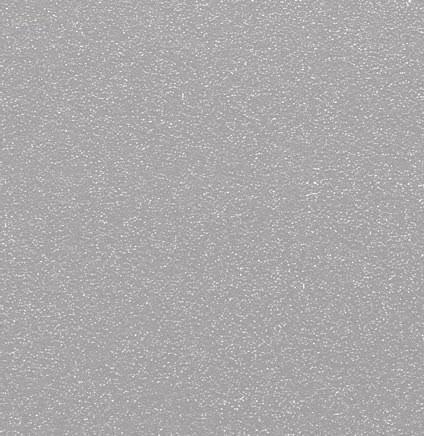
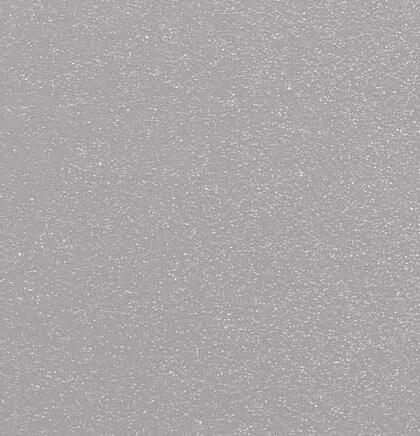
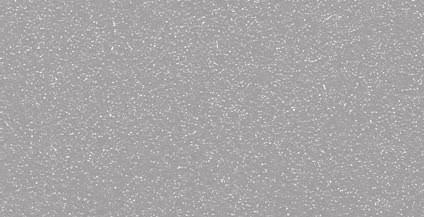





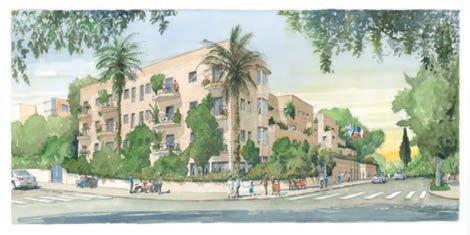



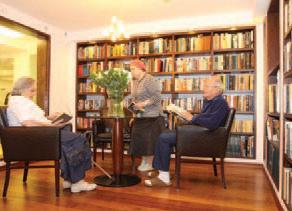

OU ISRAEL CENTER 61 27 KOREH-HADOROT ST., JERUSALEM NEVE.SHALEM @GMAIL.COM | WWW.NEVE-SHALEM.CO.IL BOUTIQUE RESIDENCE FOR SENIORS IN THE LUXURIOUS NEIGHBORHOOD OF ARNONA, JERUSALEM NEVE SHALEM IS AN ASSISTED LIVING FACILITY FOR RETIREES AND SENIORS WITH 60% ENGLISH SPEAKERS! Full calendar of activities and entertainment in English and Hebrew! Quality apartments built to high standards with balconies & gardens Professional medical services A dedicated staff providing for all the needs of our senior citizens 24/7 - Just like family! *3204 SINCE 1995 IMMEDIATE OCCUPANCY 2.5 ROOM APARTMENT + PORCH 050-524-6077
Redeeming the First Born
Last time we presented the case of a woman who delivered twins, that each developed separately in two uteruses. The woman was born with a rare congenital condition, uterus didelphys, in which she has two uteruses. She became pregnant with twins, one in her right side uterus and one in her left side, and both developed and were delivered.
Since this was her first pregnancy, would both boys born have to be redeemed in a pidyon haben? A firstborn child, if neither parents were from the tribe of Levi, needs to be redeemed in a pidyon haben ceremony. In this ceremony, the child is brought before a kohen and the father gives the kohen five silver shekel coins.
If the father was either a kohen or a levi, or the mother was the daughter of a kohen or a levi, the child would not need to have a pidyon haben. If the mother had previous children, even from a different man, the child would not need to have a pidyon haben. This is true even if the previous child did not survive, or there was miscarriage, after the child had begun to develop. This is usually around 40 days after conception, and so, generally, we assume that if the miscarriage occurred prior to this time, then the next child born would need a pidyon haben. But, if the
miscarriage occurred after 40 days, the next son born would not need a pidyon haben. In the case of doubt the son born subsequently would need a pidyon haben, which would be performed without making the blessing. This is due to the halachic principle that in cases of doubt we perform the action but do not make the bracha.
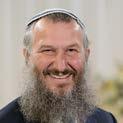
The Shulchan Aruch (Yoreh Deah 305:24) writes that in the case of a "yotzei dofen" the child does not need a pidyon haben. This literally means, "the one who came through the wall", what we call a Cesarean delivery, or C-section, since traditionally it was thought that Julius Caesar was born this way, or that he was descended from someone born this way. As Pliny the Elder wrote "a caeso matris utero", born by caesarian section. But the validity of this tale is widely debated as historical fact.
Since the delivery was not natural, the child is not liable to a pidyon haben. But, continues the Shulchan Aruch, neither is the next son liable to a pidyon haben, since he is not the firstborn.
What does this tell us about the case of uterus didelphys?
More on this next time.
The Puah Institute is based in Jerusalem and helps couples from all over the world who are experiencing fertility problems. Offices in Jerusalem, New York, Los Angeles & Paris. Contact (Isr) 02-651-5050 (US) 718-336-0603 www.puahonline.org
62 TORAH TIDBITS 1515 / BEHAR BECHUKOTAI
RABBI GIDEON WEITZMAN
Machon Puah for Fertility and Gynecology in Accordance with Halacha
Real Life Rescues
Chessed Comes Full Circle
My name is Moise Paskez and earlier tonight, I was driving on Highway 1 toward Jerusalem on my ambucycle, when suddenly things started to go wrong. The dashboard gauges began to flicker, the engine began to sputter, and before long it died completely, sending me coasting to a disappointing halt on the shoulder. After a quick consultation with United Hatzalah’s head mechanic, we decided that I should hook up my emergency jump-starter to the battery and see if it would work. This got me another few kilometers… but then the motorcycle battery AND the booster pack conked out, leaving me utterly, devastatingly stranded.

I spent more than a half-hour trying different options - calling different people, posting on various WhatsApp groups… to no avail. I began to despair of getting home at anything even remotely resembling a normal hour. Never mind the fact that there was no way in the world I would be able to get my bike to Jerusalem now… even if I were to abandon it on the side of the road, how would I get myself home? As cars and buses whizzed by me almost tauntingly, the realization sank in that I was really and truly stuck, and that only G-d could help me now…
Suddenly, out of nowhere, a truck came barreling onto the shoulder, honking furiously and flashing his headlights. On the side of the truck, in huge letters, were emblazoned the words - I kid you not!!! - “EIN OD MILVADO”. The driver rolled down his window and shouted “Brother, where do you need to go? Jerusalem? Come quickly, I’ll take you AND your motorcycle!!!” Almost as if in a dream, I watched dumbstruck as he lowered the electric jack on the back of the truck to the ground. I worked with him to heave the dead bike onto it, and into the truck. Of all things in the world, his cargo consisted of (again, I PROMISE I’m not making this up!!!) OLD MATTRESSES…. which he used to pad between my bike and the wall of the truck so that it wouldn’t even get an unnecessary scratch. Talk about an extra “kiss” from G-d! Within moments, I was sitting up front next to the driver (who told me that his sister actually used to work for United Hatzalah until 2 years ago), happily speeding toward Jerusalem. But the best part was yet to come…
While chatting with the driver, he mentioned that approximately eight years ago, he was involved in a severe motorcycle crash - the short version is that he plowed into a bus at 90 KPH. Broken pelvis, open fracture of the femur, many broken bones… you get the picture. Four United Hatzalah EMTs were the first ones on the scene. “United Hatzalah saved my life that day,” he said, his eyes gleaming with excitement. “For eight years I’ve waited for an opportunity to repay the favor. EIGHT YEARS. Today is finally my day!!!”
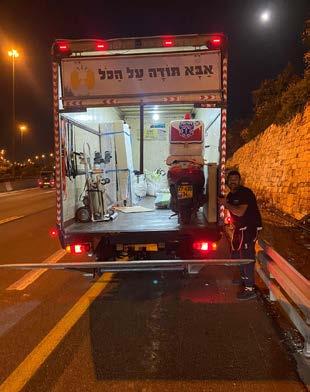

OU ISRAEL CENTER 63
1221
MEDINA & HALACHA
BY RABBI SHIMSHON HAKOHEN NADEL Mara D'atra, Kehilat Zichron Yosef, Har Nof OU Israel Faculty
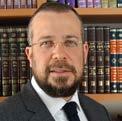
The Controversial Creation of Yom Yerushalayim: A Day in Transition
The indelible images of those six miraculous days in June 1967, along with the echo of Motta Gur's battle cry, "תיבה רה ונדיב", are forever seared into our collective consciousness: The defeat of the Syrian, Jordanian and Egyptian armies. The dramatic unification of Jerusalem and reclamation of the Temple Mount. Soldiers weeping as they touch and kiss the ancient stones of the Kotel. And the IDF's Chief Rabbi, Rav Shlomo Goren, clutching a Torah scroll, blowing the Shofar, and reciting the Beracha of Shehecheyanu.
On Thursday, the 29th of Iyyar - one day after the liberation of Jerusalem and with the war still being waged on the battlefield - Chief Rabbis Rav Isser Yehudah Unterman and Rav Yitzchak Nissim called on synagogues throughout Israel and the Diaspora to recite Hallel and offer up festive prayers on Shabbat, the 2nd of Nissan, giving thanks to Hashem for the wonders and miracles He bestowed upon them.
The Mo'etzet Harabbanut Harashit soon met to discuss establishing a festival to commemorate these miraculous events, and the idea was also discussed at
a conference of leading rabbis at Heichal Shlomo immediately following Shavuot. But with the initial euphoria following the Six Day War waning, and other important matters to address, the item was moved off the agenda. It wasn't until six months later, the 28th of Tishrei, that the Mo'etzet Harabbanut Harashit met again to discuss Yom Yerushalayim. Rav Unterman suggested commemorating the day on the 28th of Iyyar, the day Jerusalem was liberated. Rav Shaul Yisraeli, however, preferred Rosh Chodesh Sivan for the following reasons: 1. He felt that the 28th of Iyyar is too close to Yom Ha'atzmaut, and the day will not get its due.
2. As the ceasefire was declared on Rosh Chodesh, celebrating that day would be similar to how Purim was celebrated once the fighting had ceased and the people 'rested.' And
3., celebrating on Rosh Chodesh prevents any potential controversy over the recitation of Hallel, as Hallel is already recited on Rosh Chodesh! The decision was made to create a special committee and include other leading rabbis in the discussion, among them Rav Yosef Shalom Elyashiv
64 TORAH TIDBITS 1515 / BEHAR BECHUKOTAI
YOM YERUSHALAYIM
and Rav Yaakov Betzalel Zolty. On the 8th of Tevet they met again and decided by majority to establish the 28th of Iyyar as a festive day.
Following its decision, the Chief Rabbinate sent a letter to 17 additional rabbis asking them to respond with suggestions on how the day should be observed. A conference of rabbis was called for the 3rd of Adar to discuss what Tefillot should be recited, and how to mark this special day. Thirty-eight rabbis were invited to the conference - among them Poskim, Dayyanim, and Admorim from the Charedi community - but only 11 participated. Following much discussion and debate, the following decisions were made: 1. To adopt the 28th of Iyyar as a day of thanksgiving. 2. To recite Hallel without a Beracha, consistent with the ruling of the Chief Rabbinate at the
time regarding Hallel on Yom Ha'atzmaut. 3. To request that the government give a half-day vacation from work to encourage its citizens to celebrate. 4. To celebrate the day with a festive meal. 5. Further decisions to be made at a future meeting of the Mo'etzet Harabbanut Harashit.
After additional discussion and debate, a final decision was made on the 17th of Adar. The 28th of Iyyar, initially called Yom Hodayah V'Simchah, was proclaimed as a "day of great victory of Israel over her enemies and the liberation of Jerusalem, the Holy City," to be celebrated by Jews in Israel and throughout the Disapora with : 1. The reading of Shirat HaYam responsively, 2. the recitation of Hallel with a Beracha, 3. a sermon publicizing the miracle following Hallel, 4. the recitation of Psalms 107 and 5., festive meals

OU ISRAEL CENTER 65
and celebrations (Mishteh V'simchah). Rav Unterman noted that the celebration suspends the customs of mourning for those who observe customs of mourning during this part of Sefirat Ha'omer.
In Iyyar, the decision was made public. Rav Unterman pointed out that this decision was for the first year alone and that there will be further discussions as to how the day should be observed in the future. Adding to the confusion, the decision was not well publicized and the broader community was unsure as to how the day should be observed. Mizrachi and Hapoel Mizrachi publicized special Tefillot for the night of Yom Yerushalayim, which included Psalms 136 and 122, festive meals, the lighting of candles, and the study of Masechet Middot and the Rambam's Hilchot Beit Habechirah, as a way to celebrate the day.
Once the day had been adopted by the Chief Rabbinate, the Minister of Religion, Dr. Zerach Warhaftig, urged the government of Israel to declare a national holiday. But concern over the reaction by Arabs to the celebration of the unification of Jerusalem prevented the government from making a decision. In fact, the United States sent a message to Israel's Ministry of Foreign Affairs expressing its opposition to celebrating the victory as a national holiday. Two weeks before the first Yom Yerushalayim, on the 14th of Iyyar, the Israeli government decided it best that the day be celebrated as a 'religious' holiday and not a 'legal' holiday. It wasn't until March 23, 1998 - thirty years later! - that the Knesset would pass the Jerusalem Day Law, formally proclaiming the day a national holiday.
In the years that followed the Chief Rabbinate's initial decision, Yom Yerushalayim would go through a number of incarnations. The recitation of Psalms 20, 35, and 83 on both Yom Yerushalayim and Yom Ha'atzmaut was added in 1969, and in 1972 they instituted the recitation of Yizkor for fallen IDF soldiers.
The election of Rav Shlomo Goren as Ashkenazic Chief Rabbi would mean more changes. Already while Chief Rabbi of the IDF, Rav Goren had created his own Tefillah service for Yom Ha'atzmaut, different from that of the Chief Rabbinate. Now in his role as Chief Rabbi of the State of Israel, he would institute his Tefillah Chagigit for Yom Yerushalayim as well. It included Psalm 122 and the omission of Vehu Rachum at Ma'ariv. In the morning, he instituted the festive P'sukei D'zimra, with the omission of Nishmat Kol Chai, similar to what is done on Hoshanah Rabbah, Hallel without a Beracha, the omission of Tachanun and Lamnatze'ach, and the addition of the prayer for the State of Israel and the Mi Sheberach for the IDF. In subsequent years, Rav Goren would change his mind about Hallel, and encourage its recitation with a Beracha, eventually instituting half-Hallel at night without a Beracha. He also instituted the recitation of Shehecheyanu.
Rav Ovadia Yosef, who served as Sephardic Chief Rabbi at the time, did not agree with the additions made by Rav Goren. While recognizing the miracles and wonders of the Six Day War, for a number of reasons Rav Ovadia believed that it is too premature to recite Hallel with a Beracha: 1. The opposition of many leading
66 TORAH TIDBITS 1515 / BEHAR BECHUKOTAI
authorities to the recitation of Hallel, 2. in light of the tragedy of many fallen and injured soldiers, 3. King David did not institute Hallel following his conquest of Jerusalem and 4., our Holy Temple is still in ruin. Instead, Rav Ovadia believed Hallel should be recited in the morning without a Beracha, at the conclusion of the Tefillah and Tachanun should be omitted.
In 1989, Chief Rabbis Rav Avraham Shapira and Rav Mordechai Eliyahu would encourage the broader public to celebrate this profound day, and added the recitation of Psalms 91, 98, 107, and 122 before Ma'ariv, and Psalm 126 and L'Shanah Habah following Ma'ariv, in addition to the Psalms and prayers already recited by many on Yom Ha'atzmaut. They affirmed the decision of Rav Ovadia and ruled that members of the Eidot Hamizrach recite Hallel without a Beracha at the conclusion of the Tefillah.

Over the decades, gatherings and celebrations at the Kotel, Yeshivat Mercaz Harav, and the Rikudegalim flag parade would develop, marking the day.
But due to the lack of clarity and confusion caused by the many changes and additions made by the Chief Rabbinate over the years, the Religious Zionist community - who agrees the day deserves religious expression - has not yet come to a consensus as to just how the day should be observed: Hallel with or without a Beracha, at night and in the morning, or just in the morning, etc. Special Siddurim and proclamations from rabbinic organizations have attempted to streamline the Tefillot, but even today different communities observe different customs.
In addition, the day is not celebrated by the Charedi community or the broader, secular community.
Perhaps this phenomenon is not new. Chanukah was only instituted the "the following year" (Shabbat 21b), and Purim too took time before it was formally accepted (See Megillah 7a). Perhaps Yom Ha'atzmaut and Yom Yerushalayim will take some time to coalesce and crystallize, until all of Am Yisrael can put their differences aside and celebrate together these days of profound religious significance and meaning.
OU ISRAEL CENTER 67
Rabbi Shimshon HaKohen Nadel lives and teaches in Jerusalem, where he serves as Mara D'atra of Har Nof's Kehilat Zichron Yosef and Rosh Kollel of the Sinai Kollel and Chovevei Zion's Kollel Boker.
RABBI DAVID FINE

Achdut and Yerushalayim
Throughout the years many historians have suggested that the main cause for Israel’s inability to capture Jerusalem in the 1948 war was Jewish disunity. These same historians have argued that unity is what ultimately allowed for the capture of Jerusalem in 1967. Religious and spiritual leaders have claimed the same. The famous “father of the Kippot Srugot”, Rabbi Moshe Tzvi Neriah said: “In the war of liberation there was no people’s army. There were subterfuges and disputes, and if Jerusalem were to be liberated, everyone would pull in their own direction and say it’s all mine. In the Six Day War, however, we came as a united army, the people’s army, and therefore HaShem granted us the right to return to Jerusalem.” Jerusalem is synonymous with Jewish unity, and at no time in our history has the need to recognize this been more critical.
Shockingly, the name Jerusalem is not mentioned in the Torah. The Torah instead refers to “The place which God will choose (Devarim 12:5)”. One would think that the location where David would ultimately establish his kingdom and where God’s eternal presence would be found in the Beit HaMikdash would certainly be revealed.
Rambam addresses this question in
Founder and Dean of Barkai
his Guide to the Perplexed (3:45), writing that“every one of the twelve tribes would desire to have this place in its borders and under its control; this would lead to divisions and discord, such as were caused by the desire for the priesthood. Therefore, it was commanded that the Temple should not be built before the election of a king who would order its construction, and thus remove the cause of discord.” In Hilchot Melachim, Rambam rules that Israel was commanded to fulfill three mitzvot upon entering the Promised Land: a) To choose a king…b) To wipe out the descendants of Amalek,…and c) To build God’s Chosen House. Rambam rules that this order is binding;the Mikdash can only be built after the appointment of the King. Since the purpose of the king is to prevent division and bring about unity, by proclaiming the order to be binding, Rambam is teaching that unity is a prerequisite for achieving Jerusalem. The Torah avoids explicit mention of it to prevent strife.
This is not the only example of how Halacha proves that unity is Jerusalem’s most important element. Two (out of many) additional sources demonstrate this as well: The Talmud (Bava Kamma 82b) teaches that a house in Jerusalem cannot be privately sold because Jerusalem was not assigned to the Tribes (the rest of the Land was assigned to specific tribes thus allowing the sale of homes to individuals in places in Israel other than Jerusalem). Furthermore the
68 TORAH TIDBITS 1515 / BEHAR BECHUKOTAI GUEST DVAR TORAH
YOM YERUSHALAYIM
Jerusalem Talmud (Chagiga 79b) based on the verse in Tehillim “Jerusalem built like a city - SheChubra Lah Yachdav”, teaches that Jerusalem is a city that makes all Israel chaverim. The Talmud does not bring this statement simply to teach a nice concept but goes on to show that this idea has very specific implications in several important areas of Halacha.
In our past we have needed to worry about the unity of military and political leaders for Jerusalem to be captured physically. Today, each and every one of us need to make every effort to bring about unity so that Jerusalem can be the city of peace that it was meant to be for the entire world.
THIS WEEK: Urgent!
Help to cover cost of examination for cancer prevention (NIS 8500) not covered by Misrad Habri'ut for a single woman recovering from physical abuse.
• Checks: Make out to “Yesh Ezra”
Send to: Yesh Ezra, POB 31476, Romema, Jerusalem, 9136101
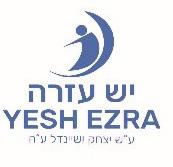
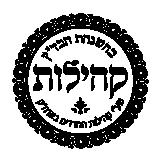
• Bank Transfer: Bank Mercantile (17), Branch 642, A/C 79747843, Yesh Ezra To obtain your tax benefit receipt, send details by Whatsapp/email.
• Credit card:
Sara at 077-820-0196
Sunday, Monday, and Wednesday (10:15am - 2:45pm)
• Website: www.yeshezra.org
Click on “Donate Now”
Inquiries: Menachem Persoff 050-570-1067 menpmp@gmail.com
Mon,
Shabbos Bistro

Premium delicious shabbes meals



Openning hours:

Thursday 12 pm-2 am
POBox 1441
Jerusalem 9101302
Friday 8 am-3 pm 02-9964469 |
Iben
OU ISRAEL CENTER 69
Rabbi David Fine is the Founder and Dean of the Barkai Center for Practical Rabbinics and Community Development.
054-8777347
Shafrut 5, Rehavia,
Jerusalem
to douse the flames of Great Lie of the Nakba
May 15 , 730 Pm @OU Israel Center, 22 Keren Hayesod A call to action: How
Presenter; Investigative journalist, David Bedein
note the updated mailing address for the OU Israel Center: OU Israel
Author, Genesis of the Palestinian Authority (2017) and UNRWA; Roadblock to Peace (2014)
Please
22 Keren Hayesod
TOWARDS MEANINGFUL TEFILLA
BY REBBETZIN ZEMIRA OZAROWSKI Director of OU Israel L’Ayla Women’s Initiative

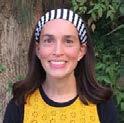
Tefillat HaDerech
When thinking about the various Brachot and Tefillot I recite throughout my day, one that I definitely have the most kavana for is Tefillat HaDerech. Every morning, after successfully getting all of my kids out of the house and running to catch the bus, I take my seat, catch my breath, and take a pause to daven for a safe trip to work. Given all the car accidents and acts of terror we hear about on a daily basis, I truly believe that every time we arrive safely at our destination, it is a miracle. Though we no longer have to deal with roadside bandits and wild animals (generally…though this week there was a video that went viral featuring a camel that had gotten lost in my yishuv and proceeded to run down the highway veering in between lanes and cars as he pleased….), we have many other very real dangers facing us on a daily basis. There is a lot of Halachic discussion as to what the parameters are for when Tefillat HaDerech is required (how far do you need to travel from a populated city, how long the drive takes, etc.). But even when a drive doesn’t fall into these Halachic parameters, it is agreed upon that one may still recite the Tefilla without
the concluding bracha and ask Hashem for a safe journey. So it seems that it can never hurt to recite the Tefilla, and can only come to our benefit.
The Shelah writes - ךרדה תליפת הרוגש םא ךכרד חטבל ךלת יזא ךיפב, if your mouth is well-versed in Tefillat HaDerech, you will be able to travel in safety. The Nimmukei Orach Chaim supports this idea as well. He writes as follows: “Many are lenient in our times not to recite Tefillat HaDerech. They explain that the roads are not currently dangerous, especially when traveling on the train. However, “their mouths speak futility.” And our eyes have seen and our ears have heard about the danger in our days, the murders, thefts, and all sorts of other calamities that take place on the roads, and also about the locomotive trains that collide with other trains or turn over and go off the tracks, and especially concerning automobiles, which are more dangerous than any wagon. Therefore, we certainly need Tefillat HaDerech, and Hashem should accept our prayers.”
Modern transportation has developed since those words were written in the early 1900’s, and train, plane, and car travel is significantly safer than it was in the author’s day. Nevertheless, the idea that Tefillat HaDerech can protect us from harm is still quite relevant today and seems to be a good practice.
Every time I recite Tefillat HaDerech,
70 TORAH TIDBITS 1515 / BEHAR BECHUKOTAI
I invariably end up asking Hashem not only to watch over me on my ride to work but to watch over me in my journey throughout the day. I never knew there was a source for this until I encountered the following quote by Rav Avraham Yitzchak HaKohen Kook in Ein Aya. Rav Kook writes as follows:
םירויצ איבמ פ”כעש ,הרימש ךירצ שדח בצמ לכ
אצוי התאשכ וליפא כ”ע…תושדח תושגרו םישדח
םייונישהו תושגרתהה תארקל ךמצע ןיכת ךרדל
איה תאזו…ךרויצב איבהל ךרדה לכותש םישדחה
הרימה אבת דחי המעש ,ךרדה תליפת תרטמ רקיע .ויארי
Any new situation requires protection, since it inevitably brings with it new challenges and new emotions…Therefore, when you travel, prepare yourself for the emotions and new changes that traveling may bring your way…This is the primary purpose of Tefillat HaDer ech, which through it will bring the best protection, since Hashem watches over those who fear Him.
May Hashem protect us on all of our journeys and throughout life, watching over us and granting us success in all our endeavors.
*Many thanks to my husband Rabbi Eli Ozarowski, English editor of Tzurba M’Rabanan, for his contribution to this article (based on his material for the upcoming volume of Tzurba)
•Yosef Ezriel ben Chaya Michal הלחמ ןב ןתנוהי
• Esther Fruma bat Baila
• Yisrael Leib ben Chana
• Chana Bat Bruriah
• Chaim Moshe Ben Leah
Be’er Tziporah a"h - Bottled Water Gemach
Walking down King George St. in Jerusalem and want a cold bottle of water?
Come help yourself to a bottle at 52 King George.
In loving memory of Yoni’s wife
Tziporah a"h, a true Eishes Chayil, always full of chessed, kindness and laughter, and brought life and strength to so many people, that she touched! She was like Aron, who loved peace and pursued peace.

Yoni thanks Hashem for having the opportunity of having Tziporah in his life, to learn of her caring, patience and happiness, to overcome her challenges. May Tziporah's Neshama be a light onto the world, in a time of darkness, and may her Neshama shine to Gan Eden. Yoni misses Tziporah with tears in his eyes, as Hashem gave him a gift, a crown jewel, now he returns her to Hashem. With thanks and Toda. Love, Yoni
To help refill the supplysend tax deductible donations for Be’er Tziporah a"h Bottled Water Gemach to Chabad of RechaviaRabbi Yisroel Goldberg email
Rabbi@JerusalemChabad.org 02 800-1717
www.JerusalermChabad.org/DonateShekels

OU ISRAEL CENTER 71
תא רומשי ’ד יכ ,הלועמה
בוט יכ 'הל ודוה
המלש האופר
...
•
רתסא ןב המלש •
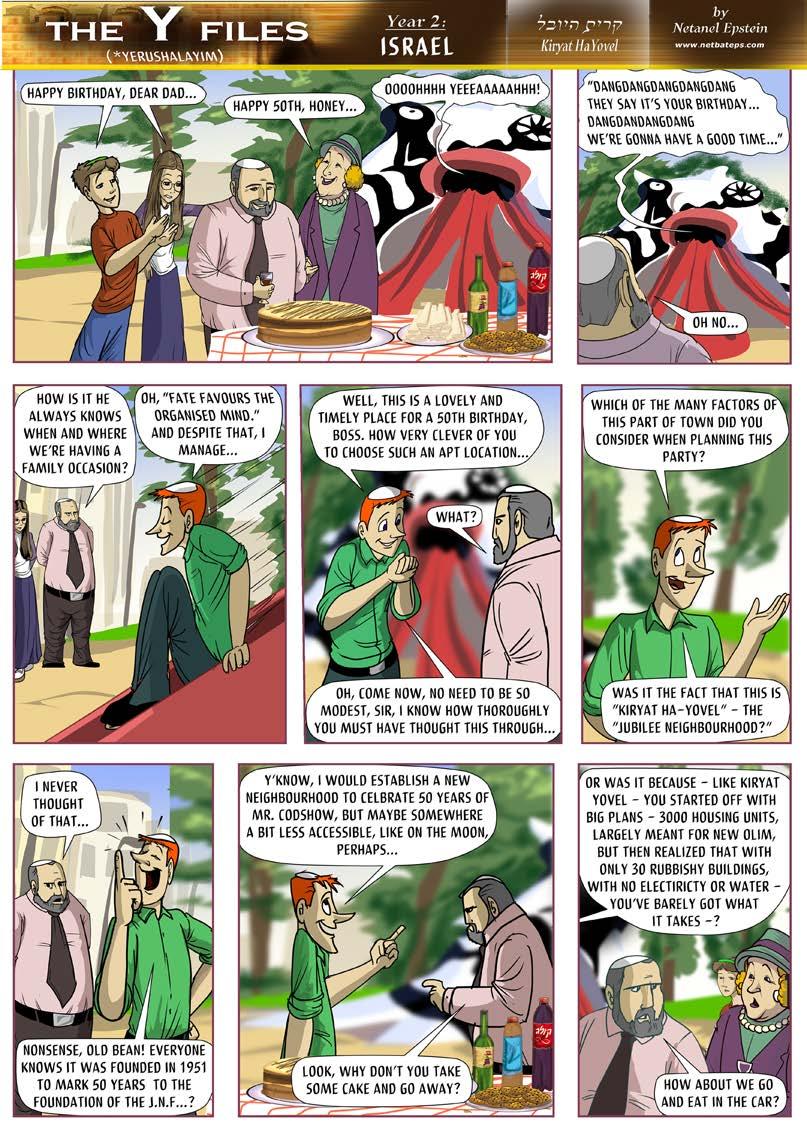
72 TORAH TIDBITS 1515 / BEHAR BECHUKOTAI
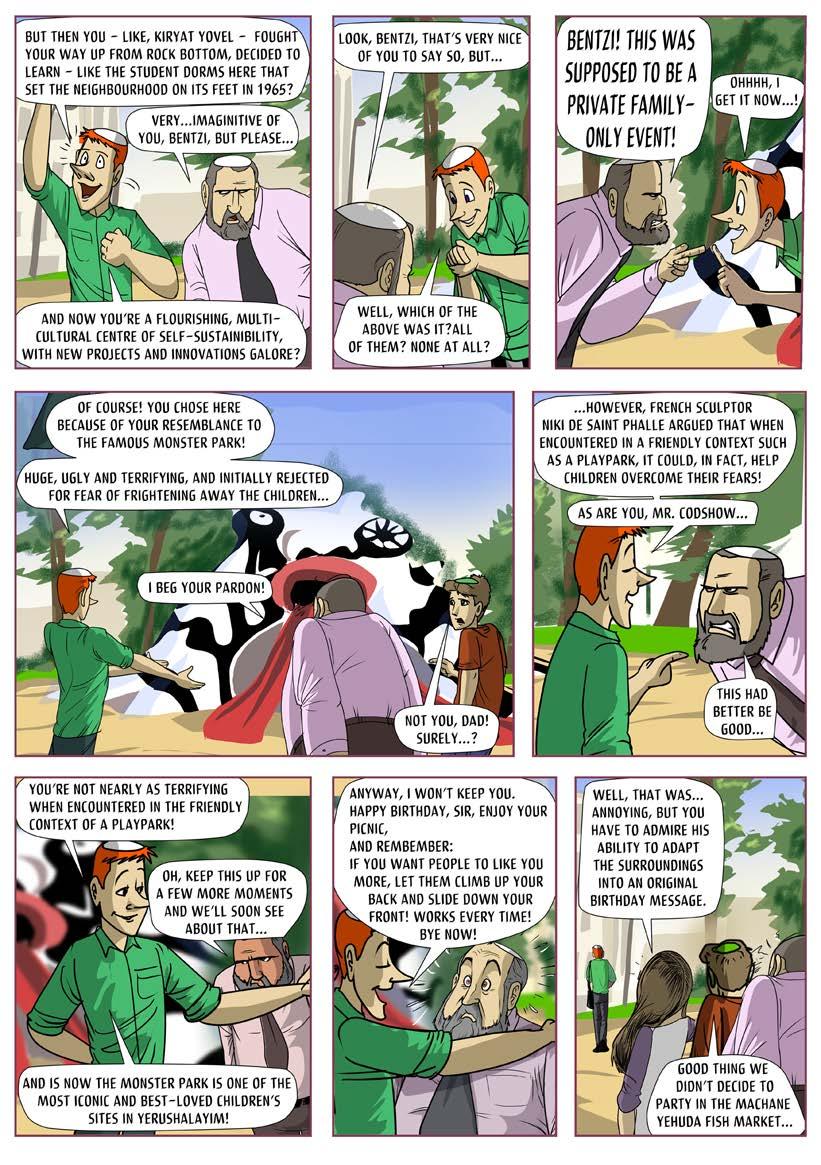
OU ISRAEL CENTER 73
Yehuda Benhamu JLIC Jerusalem
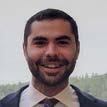
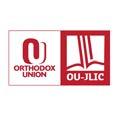
Brooklyn, NY
The Gemara Shabbat states the following warning: “Due to the sin of prohibited illicit relations, idol worship, and abdication of the Sabbatical and Jubilee Years, exile comes to the world and they exile the Jewish people from their land..” While the first two reasons for exile seem justified, for what reason would Israel's desecration of Shemitah merit such dire consequences? What makes Shemitta so fundamental to the creation and preservation of a nation?
To attempt to understand the essence of what makes Shemitta so crucial to society, we must delve into the verses. There are three consecutive verses that seemingly have varying accounts of who or what the utility of this command comes to serve. They state:
“But in the seventh year the land shall have a sabbath of complete rest, a sabbath for the Almighty, you shall not sow your field or prune your vineyard. You shall not reap the aftergrowth of your harvest or gather the grapes of your untrimmed vines; it shall be a complete sabbath for the land. This sabbath shall be for you to eat; for you, you slaves, your laborers who live with you.”
It begins by attributing the seventh year
of rest to God, it is for his sake that we rest on Shemittah. However, it then quickly transitions to stating we give the land rest for the sake of the land itself. Finally, it assigns the purpose of this command to the people themselves, for all those who work and benefit from the land to sit and rest. So which is it? Why do we have the laws of Shemittah and who exactly are they for?
The answer comes from a later verse in our Parasha that at first glance seems misplaced. Right in the middle of the discussion of all the laws and intricacies of Shemitah comes a verse that states “Do not wrong one another, but fear your God''. The essence of Shemittah is the creation of a foundation of morality that permeates every area of our society. While we usually think of morals as the appropriate behavior we have towards the world, Shemittah challenges us to move beyond that. It is to cultivate a perspective of humility, compassion, empathy, and faith within the communities we create. To leave things up to God, to give things to the less fortunate around you, and to forgive in the present on behalf of a brighter future.
What then do we make of these three different attributions in the verses? It was Lawrence Kohlberg, a psychologist and moral philosopher, who outlined three main stages of moral development. The first is pre-conventional morality, which entails an individual's motivation for acting justly as overall obedience to authority.
74 TORAH TIDBITS 1515 / BEHAR BECHUKOTAI
OU-JLIC
Orthodox Union Heshe and Harriet Seif Jewish Learning Initiative on Campus
Right and wrong are defined by the powers that be, and despite our wishes, we must go along in fear of punishment. The next stage is conventional morality, morality based on social norms and expectations of the people around us. For the sake of approval or social utility, we adhere to morals, knowing that it is what the land demands of us. The final stage, post-conventional morality, is where a person transcends mere pragmatic motivations and acts with an intuitive sense of justice. For no reason other than transcendent principles is justice required, even when it stands at odds with the world around them.
These are the very same stages the Torah was referring to for society. When we begin creating a society, we act in relation to authority, a seventh year of rest “A sabbath for God”. Once we begin to settle and build institutions, our morals must be in line with the land and community around us. To feel true compassion for the less fortunate, to sacrifice from our own in service of others. To understand what the nation requires of us and to act in accordance. A “sabbath for the land”. But to truly create a just and moral society, to create a people that are righteous no matter the circumstance, we must eventually derive our
ethical motivation from ourselves. To feel the responsibility, to emulate the Divine, and to truly recognize the intrinsic morality that the world requires. To allow the field to rest, to allow all to share, and to forgive all things because it is what God would do. “A sabbath shall be for you”.


We can now answer our original question. Why are the laws of Shemittah considered to be so axiomatic for the maintenance of society? It was Einstein who said it best “Only morality in our actions can give beauty and dignity to life”. We exist as Jews in service to a higher ideal, believing that all are created in the image of the Divine. We owe dignity and beauty to God, to those around us, and to ourselves. Without them, without morality, we are as fleeting as the wind. It is only through the internalization of those values that our nation can flourish and stand as a model to the world. We must craft a perspective of intrinsic morality, from the ground up, and have that serve as our guiding light while building our communities and ourselves.
The OU’s Jewish Learning Initiative on Campus (JLIC) is creating and nurturing vibrant religious communities in Israel to support English-speaking college students and young professionals. JLIC Israel’s goals include: building a warm and welcoming Jewish community for students and young professionals; providing engaging and dynamic Jewish education; providing a supportive home environment for Olim; providing resources for personal and religious growth, including personal mentoring, Aliyah support, religious guidance and leadership development. Current JLIC programs in Israel include: Reichman University - Herzliya; Bar Ilan University - Givat Shmuel; Tel Aviv University; Tel Aviv for Young Professionals; and Jerusalem. Contact: Rabbi Jonathan Shulman, Director of OU-JLIC in Israel shulmanj@ou.org

OU ISRAEL CENTER 75
053-‐427-‐6363 CINEMA
CITY
MALL,
JERUSALEM ArthurMSamuels@gmail.com PODIATRIST Over
30
years
experience Arthur
Samuels,
DPM Licensed in Israel & America CINEMA CITY MALL, JERUSALEM
TORAH 4 TEENS
BY TEENS NCSY ISRAEL

 Lauren Shore Beit Shemesh Chapter Director
Lauren Shore Beit Shemesh Chapter Director

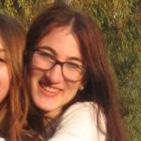
The Right Kind of Giver
In Behar, Hashem tells us that if another Jew should become impoverished, we must help them by lending money, and we may not charge interest.
It is common today to charge interest when lending money to someone to ensure it is fully returned. Why can’t we charge interest?
The first powerful lesson we learn from this commandment is that all blessings we are given in life, including how much money one has, come directly from Hashem. Since it is Hashem’s money to begin with, He has the right to tell us not to charge interest on the money we lend out.
The second lesson is designed to help us ensure that we never forget the first. Today, we are surrounded by a selfish society where people often do things for selfish reasons. Many people subconsciously will think through a “cost/benefit” analysis to see what kind of benefits they can expect to receive for their actions.
By giving us this commandment, Hashem is ensuring that when we lend money to someone, it will be completely about the person we are helping and not about us, about the other person’s needs
and not our own gain.
The ultimate form of giving is selfless giving. No matter what we give to someone in need, be it money, time, or advice, we must make sure that it is about the other person. Coming full circle this type of giving allows us to emulate how God gives! Just as He gave us this money completely selflessly, so too when we pass it on, we should try to be completely selfless as well.
Noa Feldman 10th Grade, Beit Shemesh
In the last year, there’s been a downturn in the economy. People are losing their jobs, companies are closing down, and it’s caused a lot of hardships for many families. This week’s Parsha addresses these kinds of situations and how to help others.
The Parsha starts off talking about people who are in very difficult situations. When talking about the Yovel, the fiftieth year after seven Shmita cycles, the Torah talks about a person who had to sell off all of their land and only in the fiftieth year will they get their land back. Then, it talks about a Jew who becomes so poor they have to sell themselves as a slave.
The Torah advises us and gives us a special mitzvah to help others before it gets that bad. In Vayikra 25:35 it says, “When
76 TORAH TIDBITS 1515 / BEHAR BECHUKOTAI
your brother becomes impoverished and loses the ability to support himself in your neighborhood you must strengthen him.” Elsewhere in the Torah, (Devarim 14:8) it says when your brother is poor give him money to support himself and his needs. Why does the Torah say it differently here in our Parsha?
The Torah says that before he even gets to the point that he’s poor, right when he starts to struggle you must help him before the situation gets worse. Rashi on our Pasuk gives an example of a donkey who has a heavy burden on his back and is starting to fall. While the donkey is still standing, one person could grab hold of the load before the donkey falls whereas once it falls you would need more than five people to bring it back up.
This idea is presented by The Rambam

in the eight levels of Tzedeka (Mishneh Torah, Laws of Charity, 10:7-14) where he tells us the eighth and highest level of tzedaka is to help another Jew by giving them the ability to support themselves rather than giving them charity to take care of their immediate needs. This could be done by giving them an interest-free loan (this is also a Mitzva mentioned in this week’s Parsha) to start a business, involving them in a partnership, or finding a job opportunity for them. Give them a fishing rod rather than a fish.
I think this is a very good teaching from the Torah because the person who is receiving charity might feel a little embarrassed and helpless. This way of helping others makes them feel empowered so they are not dependent or reliant on others while still getting the help they need.
OU ISRAEL CENTER 77
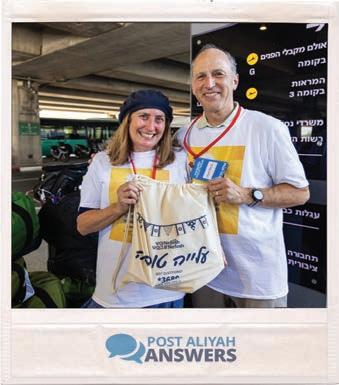
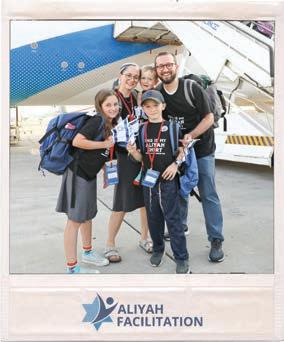

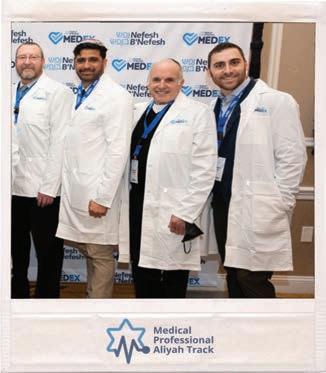
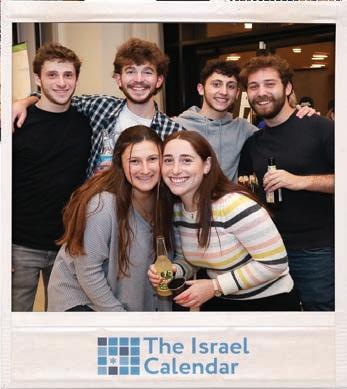

78 TORAH TIDBITS 1515 / BEHAR BECHUKOTAI YOUR ALIYAH FLIGHT FACILITATE • CELEBRATE • ADVOCATE • EDUCATE WORKING IN PARTNERSHIP TO BUILD A STRONGER ISRAEL THROUGH ALIYAH Got Aliyah questions? We've got answers! *3680 answers@nbn.org.il
JOIN US IN PAYING TRIBUTE TO THE LEGACY OF A FALLEN HERO OF ISRAEL.
MAKE A MEANINGFUL CONTRIBUTION BY DONATING TOWARDS AN AMBUCYCLE IN YONI JESNER’S MEMORY.
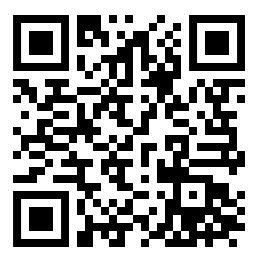
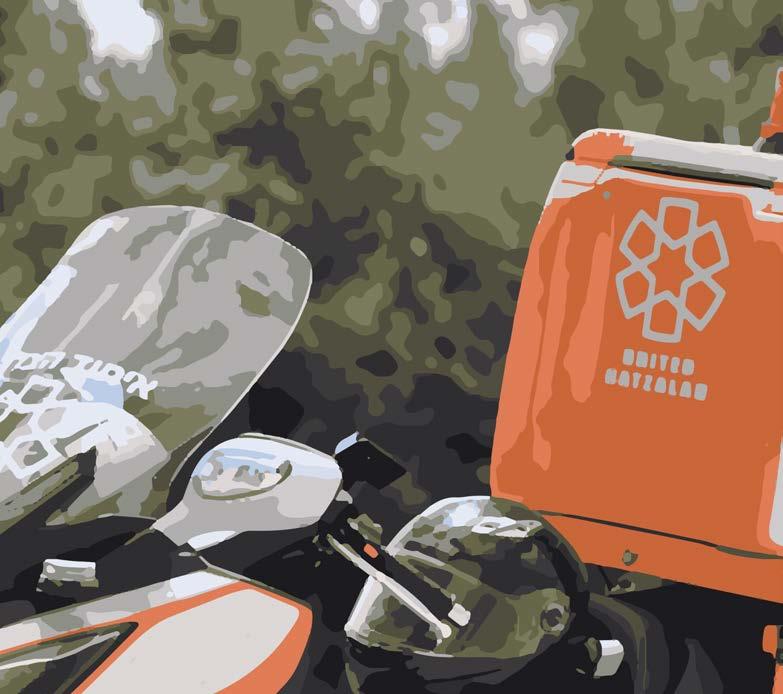
ALL DONORS WILL BE GIVEN AN OPPORTUNITY TO HELP NAME THIS AMBUCYCLE.
https://israelrescue.org/younameit
OU ISRAEL CENTER 79 UNITED HATZALAH
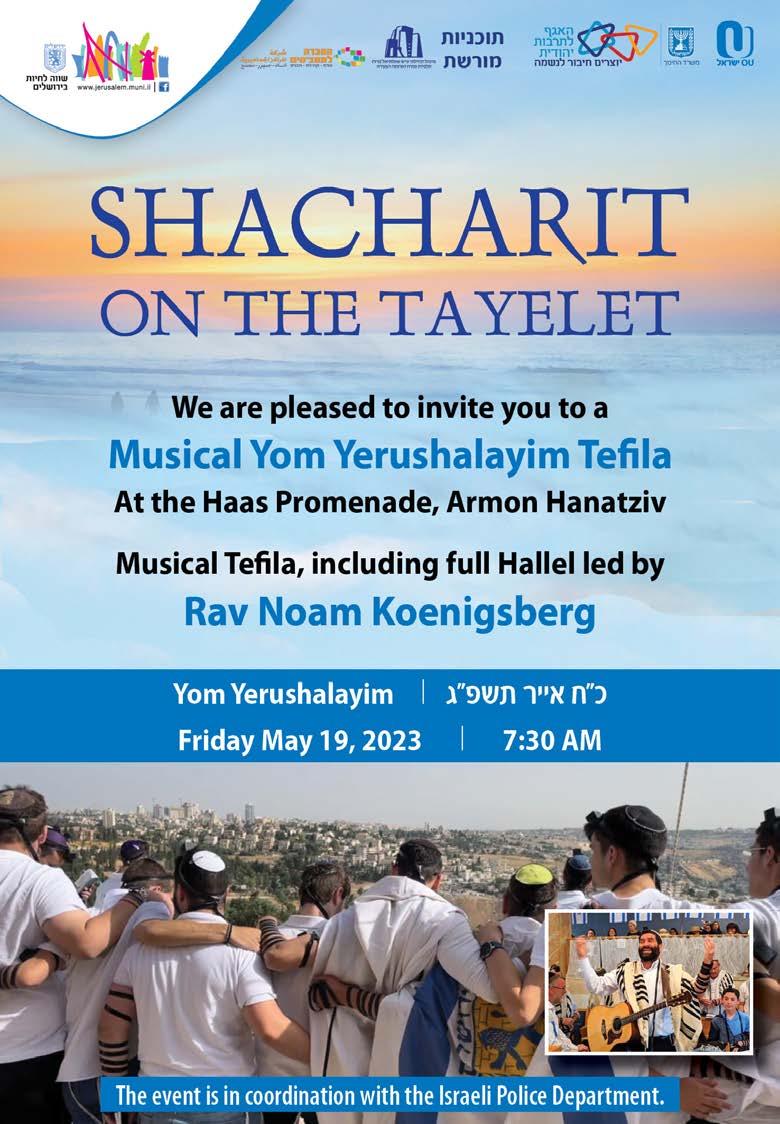


































































































































































































































 RAV DANIEL MANN
RAV DANIEL MANN















































 Lauren Shore Beit Shemesh Chapter Director
Lauren Shore Beit Shemesh Chapter Director










